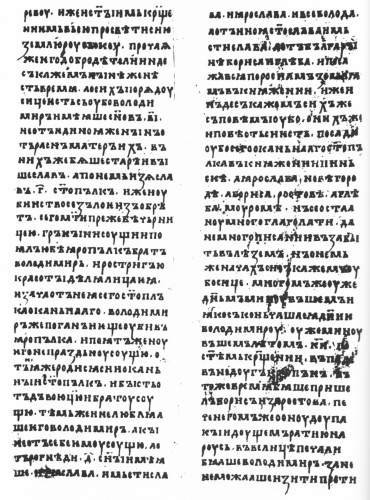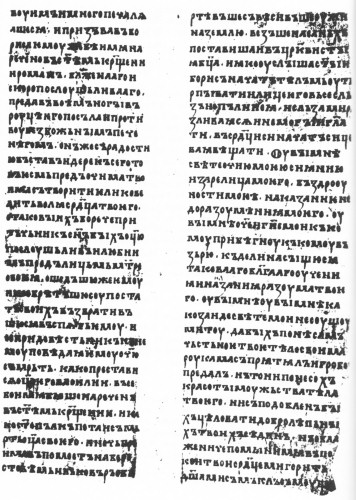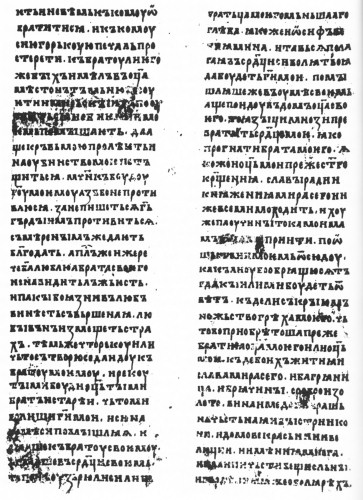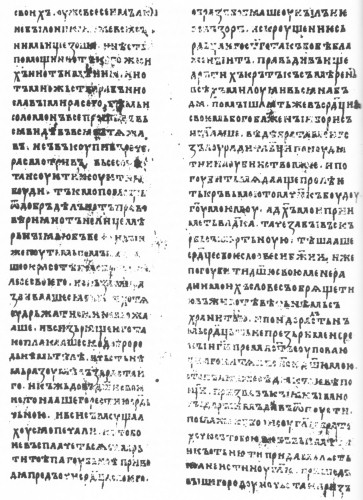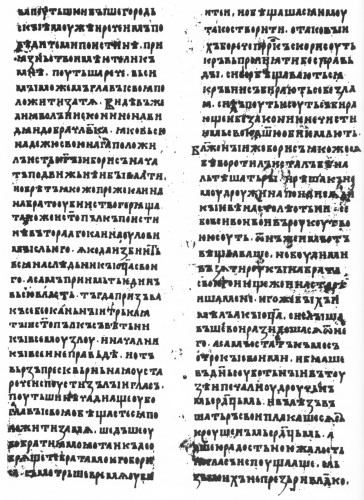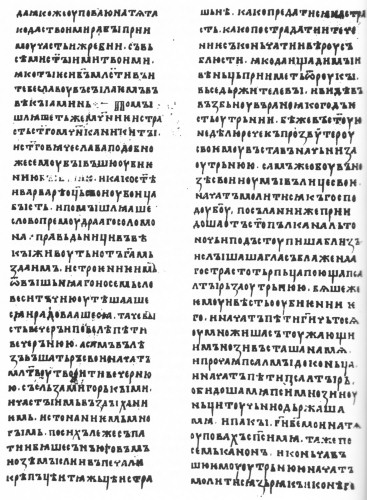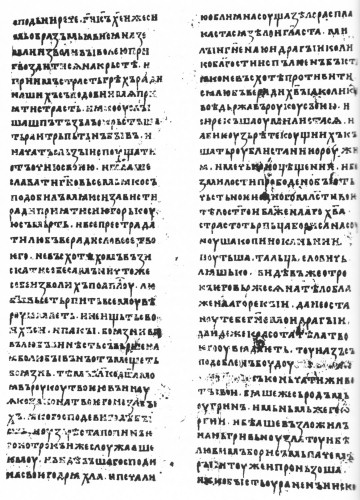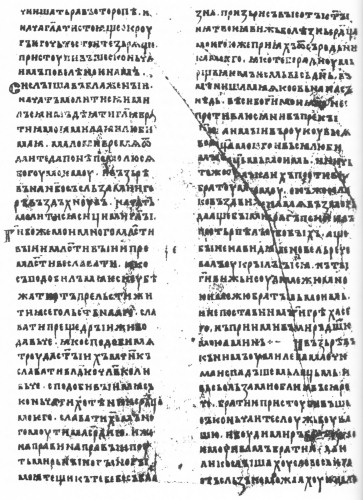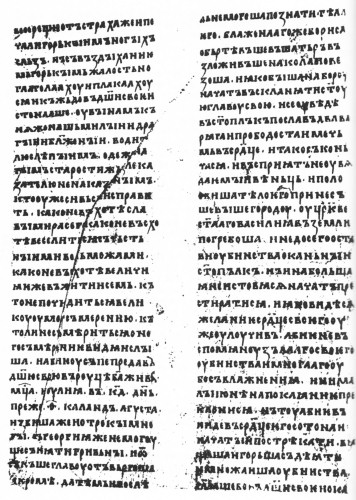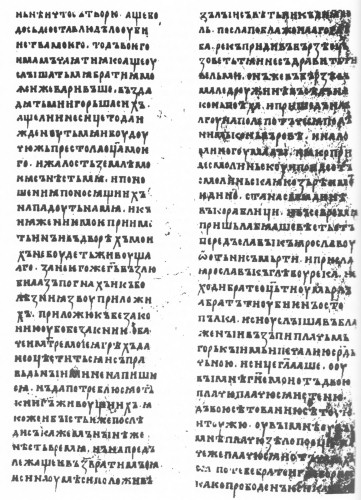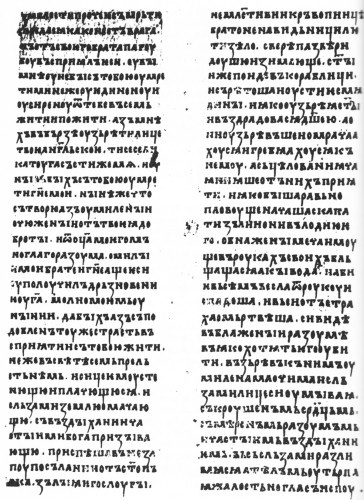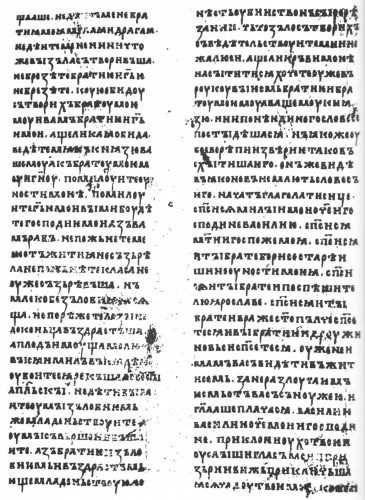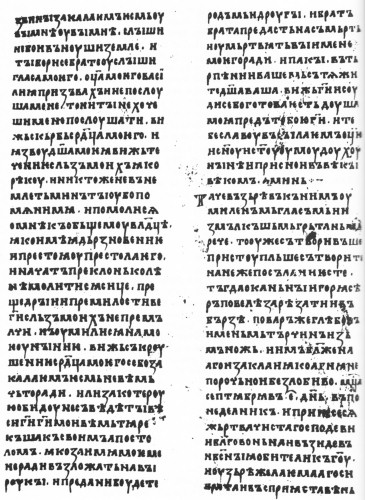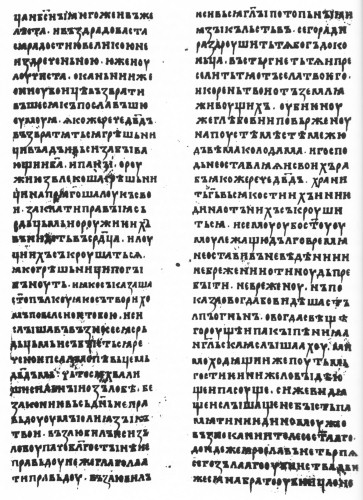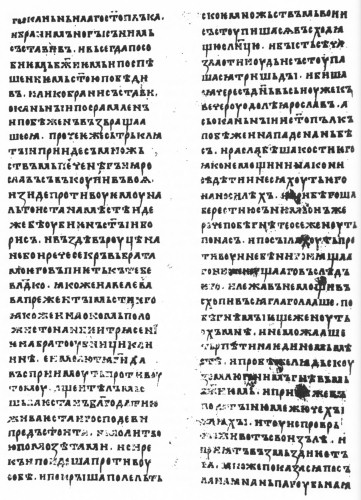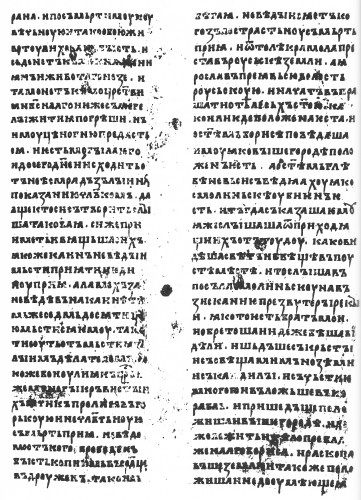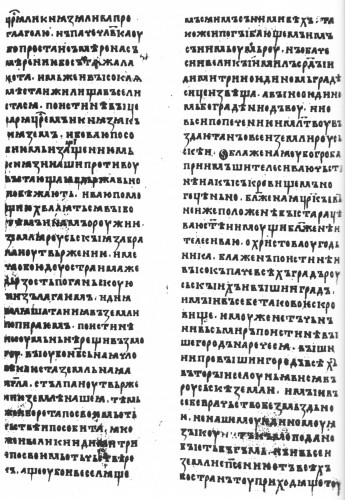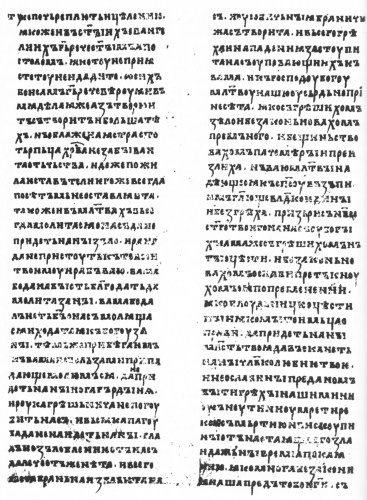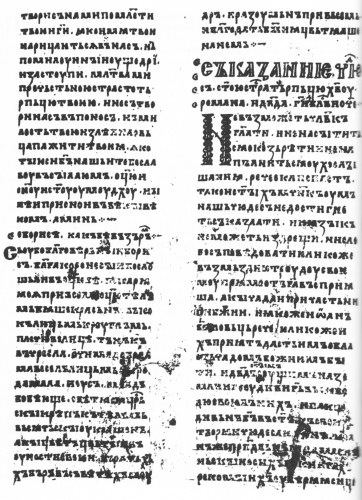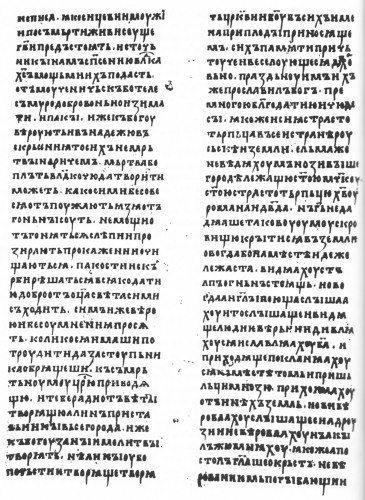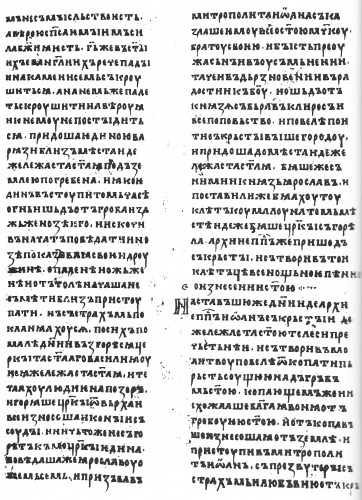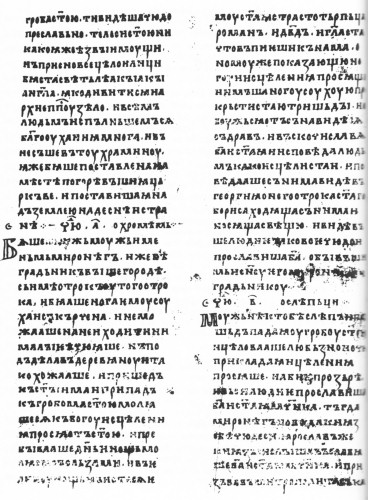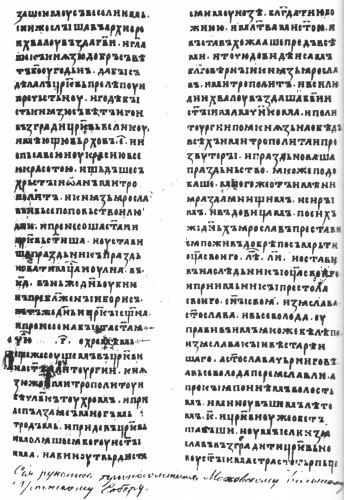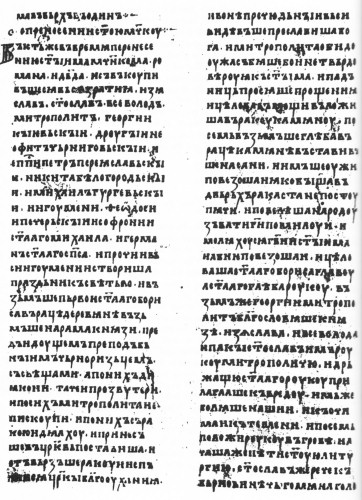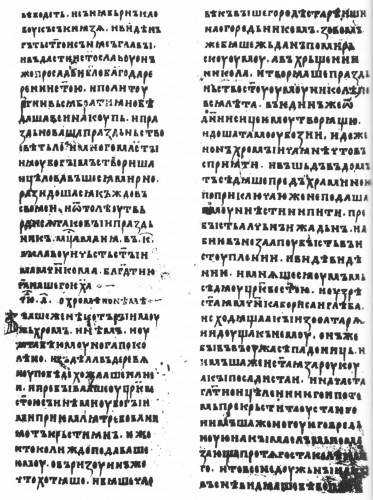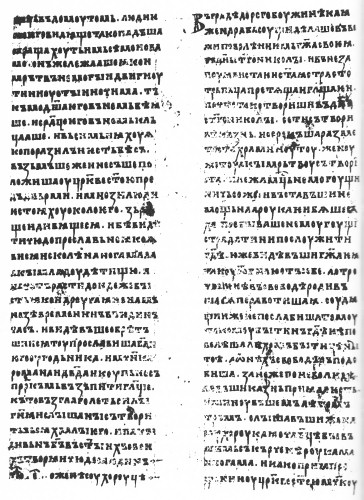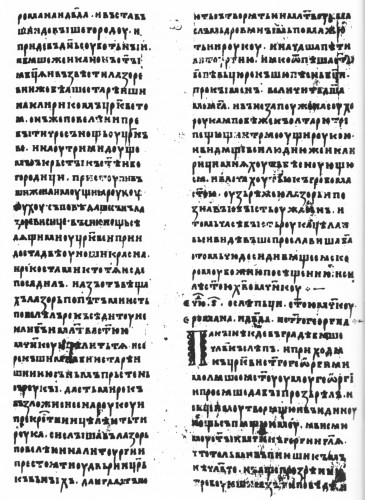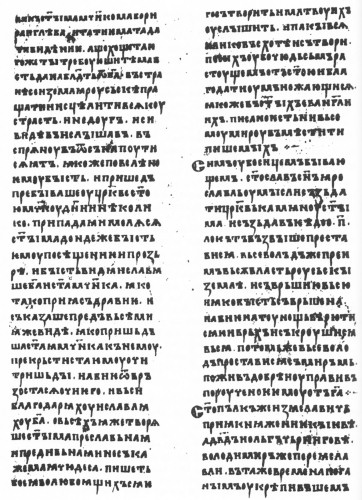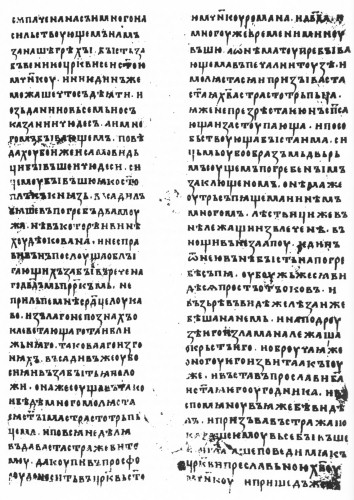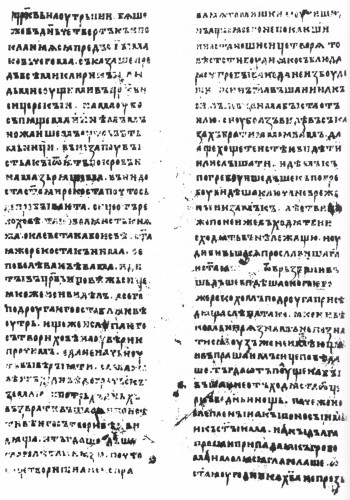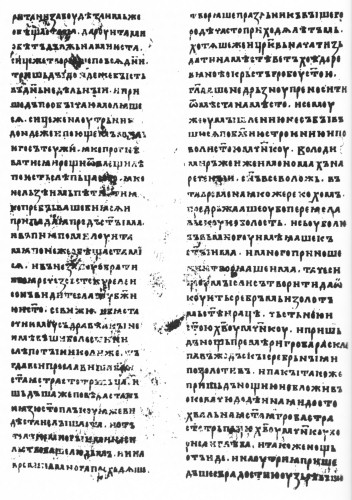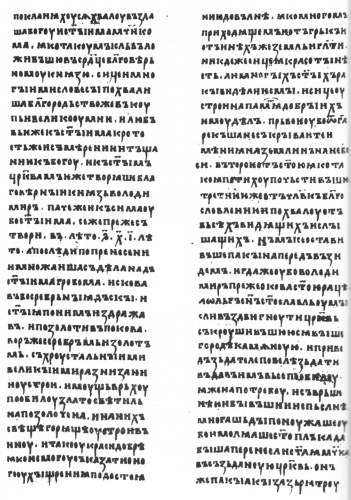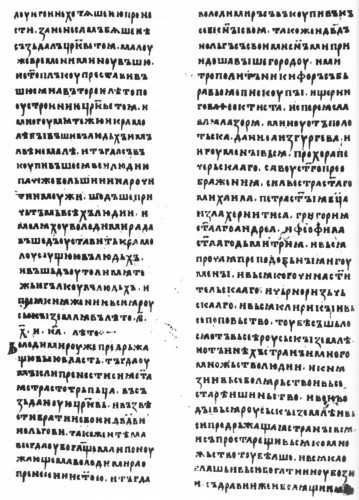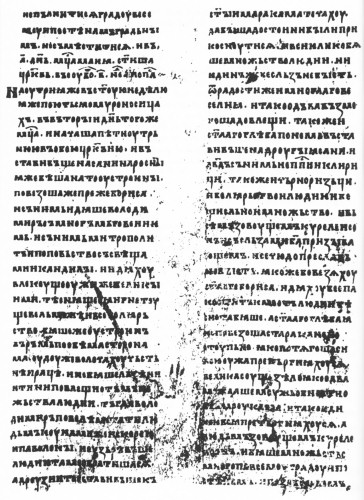THE NARRATIVE, PASSION, AND ENCOMIUM OF BORIS AND GLEB
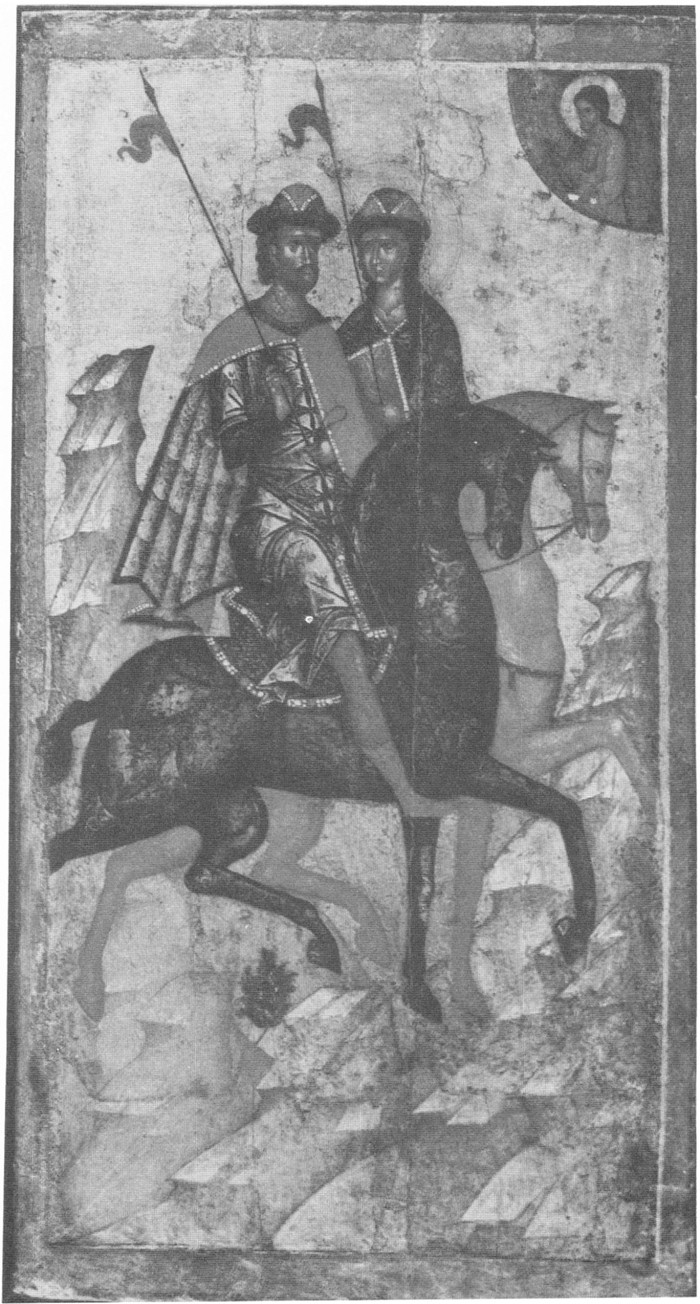
Boris and Gleb (XIV-century icon)
- About Boris and How He Looked
- Narrative of the Miracles of Christ’s Holy Martyrs, Roman and David
- On the Disinterment of the Saints
- The First Miracle: About the Lame Boy
- The Second Miracle: About the Blind Man
- The Third Miracle: About the Lame Man
- On the Translation of the Holy Martyrs
- The Fourth Miracle: About the Lame and Mute Man
- The Fifth Miracle: About the Woman with the Withered Hand
- The Sixth Miracle of the Holy Martyrs Roman and David and Saint George: About the Blind Man
- Passages excerpted from D.I. Abramovič
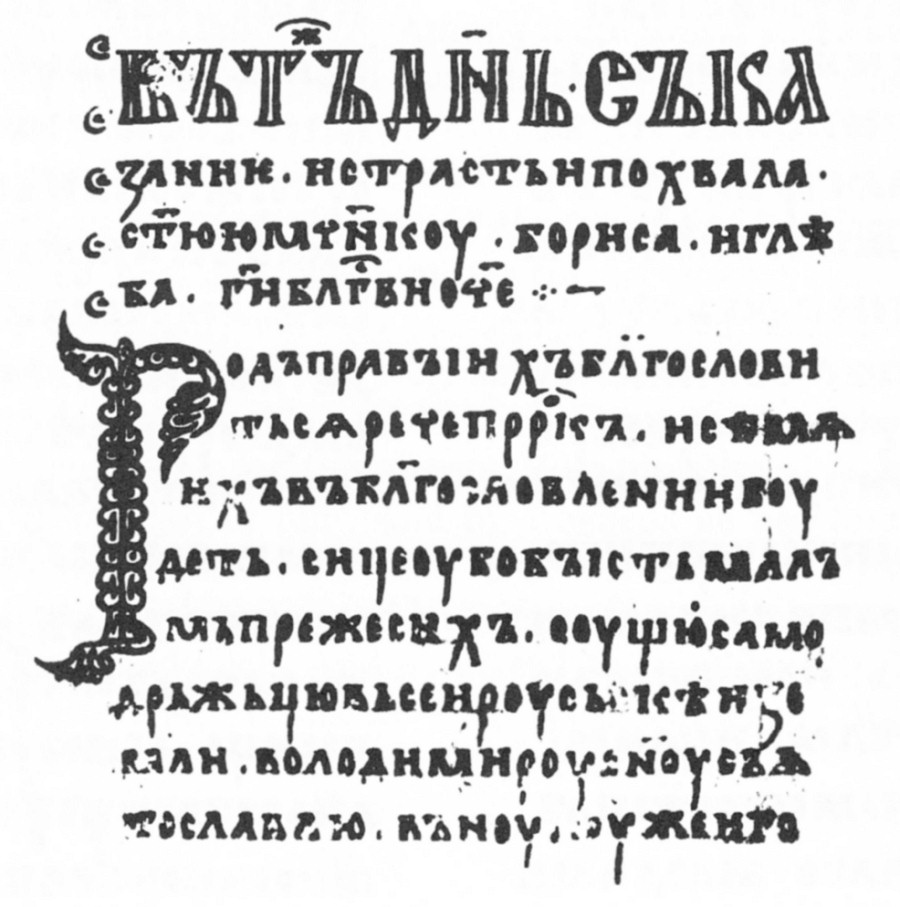
ON THE SAME DAY [1]
The Narrative and Passion and Encomium of the
Holy Martyrs Boris and Gleb
Bless us Lord, Our Father
The generation of the righteous shall be blessed, said the prophet, and their seed shall be blessed. [2] Thus, these things came to pass before the time when the autocrat of the entire land of Rus’ was Volodimir, son of Svjatoslav
165
![]()
![]()
166
![]()
167
and grandson of Igor, he who enlightened this entire land of Rus’ with holy Baptism. [3] Of his other virtues we shall speak elsewhere, there is not time now, but of such things we shall speak in due course.
Now this Volodimir had twelve sons, not by one wife, but by their several mothers. [4] Among these sons Vysheslav was the eldest, and after him came Izjaslav. The third was Svjatopolk, who conceived this evil murder. His mother, a Greek, was formerly a nun, and Jaropolk, Volodimir’s brother, took her, and because of the beauty of her face he unfrocked her, and begot of her this accursed Svjatopolk. But Volodimir, who was still a pagan, killed Jaropolk and took his wife, who was pregnant; and of her was born this accursed Svjatopolk. And he was of two fathers who were brothers, and for this reason Volodimir loved him not, for he was not of him. And by Rogneda he had four sons: Izjaslav, Mstislav, Jaroslav, and Vsevolod; and by another he had Svjatoslav and Mstislav, and by a Bulgarian woman, Boris and Gleb. And he placed them all in different lands as rulers; of this we shall speak elsewhere. We shall now tell of those whom the story concerns.
He placed the accursed Svjatopolk as ruler in Pinsk, and Jaroslav in Novgorod, Boris in Rostov, and Gleb in Murom. But I will cease speaking of this at length, lest we lose ourselves through prolixity in forgetfulness. But let us speak about what I began.
Now after many days had passed and Volodimir's days were drawing to a close-for twenty-eight years had passed since the holy Baptism—he fell gravely ill. At that same time Boris was coming from Rostov. The Pechenegs [5] from that region were waging war against Rusk And Volodimir was in great sorrow because he could
![]()
168
![]()
169
not march against them, and he sorrowed much. And summoning the blessed Boris—who was named Roman in holy Baptism and was quick in obedience —and turning over many troops to him, he sent him against the godless Pechenegs. And rising with joy he went, saying, “I am prepared to do before your eyes as much as the will of your heart commands.” For of such did the author of the Proverbs say: “I was my father’s son, obedient and beloved in the sight of my mother.” [6] (Proverbs 4:3)
But after setting out and not finding his adversaries, he turned back. And a messenger came to him, informing him of his father’s death: How his father Vasilij —for such was the name given him in holy Baptism—had passed away, [7] and how Svjatopolk had concealed the death of his father, and at night in Berestovo, [8] after taking up the floor and wrapping him in a rug, they had lowered him to the ground with ropes, took him by sledge [9] and placed him in the Church of the Holy Mother of God.
And when the saintly Boris heard this he grew weak in body, and his entire face was covered with tears. And being choked with tears, he could not speak, but in his heart he began to speak thusly: “Woe unto me, light of my eyes, radiance and dawn of my face, bridle of my youth, admonition of my foolishness! Woe unto me, my father and lord! To whom shall I turn, to whom shall I look, where shall I sate myself with the good instruction and admonitions of your understanding? Woe unto me, woe unto me! How could you vanish, my light, while I was not there? If only I myself had prepared your venerable body for burial with my own hands and committed it to the grave. But I neither carried the manly beauty of your body, nor was I worthy of kissing your resplendent gray hair. But, O blessed one, remember me in your peace! My heart burns, my soul confuses my mind, and I know
![]()
170
![]()
171
not to whom to turn, and to whom to extend this bitter sorrow. To the brother whom I would have in place of a father? But he, methinks, has learned worldly vanities and contemplates my murder. If he sheds my blood and attempts to slay me, then a martyr shall I be unto my Lord. For I shall not resist, because it is written:
‘God resisteth the proud, but giveth grace unto the humble.’ [10] (James 4:6) And the Apostle says: ‘He who says, I love God, and hateth his brother, is a liar.’ [11] (I John 4:20) And again: ‘There is no fear in love; perfect love casteth out fear.’ [12] (I John 4:18) Therefore, what shall I say or what shall I do? Lo, shall I go to my brother and say, ‘Be a father to me. You are my brother and elder. What is your command, my lord?’ ”
And musing thus in his mind, he set off to his brother, and he said in his heart: “Were I at least to see the face of my younger brother Gleb, as Joseph did Benjamin.” [13] And considering all this in his heart, he said, [14] “Thy will be done, my Lord.” And in his mind he thought: “If I go to my father’s house, many tongues there will incline my heart toward banishment of my brother, just as my father acted before holy Baptism for the sake of glory and princely power in this world, all of which passes away, being less than a cobweb. So whither must I go upon departure from this place? And how shall I return then? What will an answer be for me?
Where shall I conceal the multitude of my sins? For what did my father’s brothers or my father heretofore acquire? Where are their lives and their worldly glory, the purple robes and silks, the silver and gold, the wines and meads, the fine food and swift steeds, the great and beautiful homes, the many possessions, the tribute and countless honors, and the pride in their boyars?
![]()
172
![]()
173
All this already is for them as though it had never been. Everything has vanished with them, [15] and there is no help from any one of them nor from their possessions, from a multitude of slaves nor from the glory of this world. For Solomon, having passed through all things, having seen all things, having acquired and accumulated all things, did say after casting his eyes about: ‘Vanity of vanities; all is vanity!’ [16] Help comes only from good deeds, from true belief, and from unfeigned love.” [17]
Continuing on his way, he considered the beauty and goodliness of his body and was completely choked with tears. And wanting to restrain himself, he could not. And all who saw him thus wept for his virtuous body and the venerable understanding of his age. And each in his soul groaned with heartfelt grief, and all were troubled in their sorrow. For who would not bemoan that grievous death upon drawing it before the eyes of his heart! For his countenance and gaze were downcast, and his holy heart was broken. For this blessed one was just and compassionate, serene, gentle, humble, merciful to all and solicitous of all. And the divinely blessed Boris meditated in his heart and said: “I know my brother is incited by men of evil intent to slay me, and he will destroy me. If he sheds my blood, then a martyr shall I be unto my Lord, and the Lord will receive my spirit.” Then, forgetting his deathly sorrow, he comforted his heart with the divine words: “Whosoever shall lose his soul for My sake and for the sake of My words, shall find it and keep it in life eternal.” [18] And he went on with a joyful heart, saying: “O most merciful Lord, despise not me, who trusts in Thee, but save my soul.”
Now after his father’s death, Svjatopolk had settled in Kiev. Upon summoning the people of Kiev and giving them many gifts, he dismissed them. Then he sent to Boris, saying: “Brother, I wish there to be love between us and shall add to your share of father’s possessions.” [19] But he spoke deceitfully and not the truth. He came secretly at night to Vyšegorod, [20] summoned Put’ša
![]()
174
![]()
175
and the men of Vyšegorod, and said to them: “Tell me in truth, are you loyal to me?” And Put’ša said: “We all are ready to lay down our lives for you.”
But the Devil, that hater of man’s goodness from the beginning of time, upon seeing the saintly Boris had placed all his hope in the Lord, began to be even more active. And as once before he found Cain ablaze with fratricide, so now he found in truth a second Cain in Svjatopolk, and snared his thought, that he should kill all his father’s heirs and seize all power for himself alone. Then the thrice-accursed Svjatopolk summoned to himself the counselors of all evil and the chiefs of all untruth, and upon opening his lips most foul, he emitted a evil voice, saying to Put’ša’s people: “Since you promise to lay down your lives for me, go in secret, my friends, and where you find my brother Boris, watch for an opportunity and slay him.” And they promised to do so. For of such the prophet said: “They make haste to shed blood unjustly; for they pledge blood and gather evil unto themselves. Their ways are those of gathering iniquity; and they embrace their souls with impurity.” [21]
Now, upon returning, the blessed Boris pitched his tents on the L’to. [22] And his retinue said to him: “Go, settle in Kiev on your father’s throne, for all the troops are in your hands.” But he answered them: “It is not for me to raise my hand against my own brother, and especially against an elder one whom I would have as a father.” And when they heard this, the troops departed from him, and he remained with only his retainers.
On the Sabbath day he was in distress and grief, and his heart was oppressed. And he entered his tent and wept with a broken heart but a joyful soul, sorrowfully lifting his voice: “Despise not my tears, O Lord. For
![]()
176
![]()
177
as I have my hope in Thee, so shall I, together with Thy servants, accept my portion and lot with all Thy holy ones, for Thou art a merciful God, and unto Thee shall we render praise forever. Amen.” He thought of the martyrdom and passion of the holy martyr Nikita and of Saint Vjačeslav, whose murders were similar to this, and how the murderer of Saint Barbara was her own father. [23] And he thought of the word of the wise Solomon: “The righteous live for evermore; their reward also is with the wisdom of Lord, the care of them is with the Most High.” (Wisdom of Solomon 5:15) And only Solomon with this word was he comforted, and he rejoiced.
Then evening came. And he commanded that Vespers be chanted, and he himself entered his tent and began to say the evening prayer with bitter tears, frequent sighs, and much groaning. Afterwards he lay down to sleep. And his sleep was troubled by many thoughts and a great, heavy, and terrible grief: How to give himself up to the martyr’s passion; how to suffer and end the course [24] and keep the faith so as to receive the predestined crown from the hands of the Almighty.
Upon awakening early, he saw it was the time of morning; it was holy Sunday. He said to his presbyter, “Arise, begin Matins.” And having put shoes on his feet and having washed his face, he himself began to pray to the Lord God. But those sent by Svjatopolk had arrived on the L’to during the night, and drawing near they heard the voice of the blessed martyr chanting the morning psalter. And since he had knowledge of his murder, he began to chant: “Lord, how are they increased that trouble me! Many are they that rise up against me,” (Psalm 3:1) and other psalms in their entirety. And he began to chant the psalter: “Many dogs have compassed me and fat bulls have beset me round”; [25] (Pslam 7:1) and also, “O Lord my God, in Thee do I put my trust: save me.” After this he chanted the canon in the same way. And when he finished Matins, he began to pray, gazing upon the icon of the Lord and saying:
![]()
178
![]()
179
“O Lord Jesus Christ, Who in this image didst appear upon earth, having by Thy will chosen to be nailed to the cross, accepting Thy passion for the sake of our sins, make me worthy of accepting my passion.”
And when he heard evil whispers near the tent, he was atremble, and began to shed tears from his eyes, and he said: “Glory be to Thee, O Lord, for all things; for Thou hast made me worthy of accepting this bitter death, prompted by envy, and to suffer all things for the love of Thy word. I desired not [26] to seek for myself alone, and have chosen nought for myself, according to the Apostle: ‘Charity beareth all things, believeth all things, and seeketh not her own’; [27] and also: (I John 4:18) ‘There is no fear in love; but perfect love casteth out fear.’ Therefore, O Lord, my soul is ever in Thy hands, for the law I have not forgotten. As it pleaseth the Lord, so be it.” And when the priest and the retainer who served him looked and saw their lord downcast and overwhelmed by grief, they began to mourn greatly and said: “O dear and precious lord of ours, how filled with goodness you are that for the sake of the love of Christ you desired not to resist, though many were the troops you held in your hands.” And having said this, they were saddened.
And at that moment he saw those running toward the tent, the flash of weapons and the unsheathing of swords. And the venerable body of the most merciful Boris, Christ’s holy and blessed martyr, was pierced without mercy. Those who stabbed him with lances were the accursed Put’ša, Tal’ts, Elovič, and Ljaš’ko. Upon seeing this, his retainer threw himself upon the body of the blessed one, saying: “I shall not leave you, my precious lord; where the beauty of your body withers, there too will it be granted me to end my life.” He was a Hungarian by birth named George, and upon him was placed a golden necklace; and he was loved by Boris beyond measure. And they ran him through on that spot.
And as he was wounded, Boris ran out of the tent
![]()
180
![]()
181
in haste. And those standing around him began to say: “Why do you stand gazing? Let us end what was begun and do as we were commanded.”
Hearing this, the blessed one began to pray and ingratiate himself to them, saying: “My dear and beloved brethren, grant me a little time that I may at least pray to my God.” And upon glancing tearfully up at the heavens and sighing bitterly, he began to pray with these words: “God of many mercies, my merciful and most merciful Lord! Glory be to Thee, that Thou hast made me worthy to flee from the deception of this deceitful life. Glory be to Thee, most compassionate Giver of life, that Thou hast made me worthy of the suffering of the holy martyrs. Glory be to Thee, O Lord, Lover of man, that Thou hast made me worthy to fulfill the desire of my heart. Glory be to Thee, my Christ, to Thy great compassion, that Thou hast directed my worldly feet onto the right way, running to Thee without fault. Look down from Thy holy heights and see the sickness of my heart, which I caught from my kinsman, that for Thy sake I am killed this day. [28] (Psalm 44:22) I am counted as a sheep for the slaughter. For Thou knowest, my Lord, that I shall neither resist nor speak contrarily. Though I had all my father’s troops in my hands and all whom my father loved, yet I plotted nought against my brother. But he has found it possible to rise up against me so greatly. If an enemy reproached me, I could have borne it; if he that hated me did magnify himself against me, I would have hid myself. [29] But, Thou, O Lord, behold and judge between me and between my brother; [30] (Acts 7:60) and, Lord, lay not this sin to their charge, but receive my spirit in peace. [31] Amen.”
Then, looking at them with tender eyes and a downcast face, and bathed in tears he said: “Brethren, end the service you have begun; and peace be unto my brother, and unto you, my brethren.”
And all those hearing his words were unable to utter a single word because of tears and fear, and bitter grief,
![]()
182
![]()
183
and much weeping, but with bitter sighs they wept, and each groaned in his soul and said mournfully: “Woe unto us, our dear and precious prince, guide for the blind, clother of the naked, staff for the aged, teacher for the untaught! Who will do all these things now? For surely he did not desire the glory of this world; he did not desire revels with venerab’e nobles; he did not desire the grandeur found in this life! Who does not marvel at his great humility; who is not humbled, seeing and hearing of this humility!” And at that moment he passed away and delivered his soul into the hands of the living God, in the month of July, on the twenty-fourth day, the ninth day before the calends of August. [32]
And they also slew many retainers. But since they could not remove the necklace from George, they cut off his head and tossed him aside, and for that reason his body could not be recognized later. Upon wrapping the blessed Boris in a tent flap and laying him in a wagon, they drove off. And when they were in a pine forest, he began to raise his holy head. Learning of this, Svjatopolk sent two Varangians, and they pierced him through the heart with a sword. Thus he expired and received a crown everlasting. After having brought him to Vyšegorod, they laid his body in the earth and buried it near the Church of Saint Vasilij. [33]
And the accursed Svjatopolk stopped not with this murder, but rabidly began to crave even greater ones. And as it was evident his heart’s desire had been gained, he immediately forgot his evil murder and great offense and did not, therefore, give himself over in the least to repentence. But it was at this moment that Satan entered his heart [36] and began to spur him to commit greater, crueler, and more numerous murders. For he said in his
![]()
184
![]()
185
accursed soul, “What shall I do? If I abandon the matter of this murder of mine now, I must expect two things. If my brothers find me out, then they, anticipating me, will deal with me even more bitterly. And if not this, they will drive me out, and I will be a stranger to my father’s throne, and the sorrows of my land will devour me, and the scorn of the scorners will fall upon me; another will receive my principality, and none will dwell in my courts, for I have persecuted the one the Lord did love, and added a wound to grief. Thus I shall add iniquity to iniquity. Let not the sin of my mother be expiated, and let me not be recorded with the righteous, but let my name be expunged from the book of the living.” [37]
And so it came to pass, as we shall relate later; there is no time for this now. But let us return to the foregoing.
Having put this in his mind, that evil counselor the Devil summoned the blessed Gleb, saying: “Come quickly, your father summons you and is very sick.” He quickly mounted his horse and set off with a small retinue. And when he came to the Volga, the horse beneath him stumbled over a rut in the field and slightly injured its leg. [38] And he came to Smolensk, and went on from Smolensk, and within viewing distance therefrom he boarded a small vessel on the Smjadin’. [39]
At that time news of his father’s death reached Jaroslav from Predslava. [40] And Jaroslav sent a message to Gleb, saying: “Do not go, brother, your father has died, and your brother has been murdered by Svjatopolk.”
Upon hearing this, the blessed one cried out with bitter weeping and heartfelt grief, saying: “O woe unto me, my Lord! With twofold weeping I weep and moan, with twofold grief I grieve and groan. Woe unto me, woe unto me! I weep greatly for my father, but I weep even more and have despaired for you, my brother and lord Boris. How is it that you have been run through! How is it
![]()
186
![]()
187
that you have been delivered to death without mercy! How is it that you have received your ruin not from an enemy but from your own brother! Woe unto me! Better it would have been for me to die with you than to live on in this life, alone and orphaned without you. I thought soon to see your angelic face, and behold, such distress has o’ertaken me. In hopeless grief I would have died with you, my lord! And now what shall I do, wretched and separated from your goodness, and from the great wisdom of my father? O, my dear brother and lord! If you received courage from the Lord, pray for me in my grievous hopelessness, that I may be made worthy to receive the same passion and to abide with you rather than in this deceitful world.”
And so, as he was groaning and weeping,and wetting the earth with his tears, and calling upon God with frequent sighs, those sent by Svjatopolk suddenly arrived — those evil servants of his, merciless bloodsuckers, the fiercest of fratricides, having the souls of savage beasts. [41] The saintly one had set off in a small vessel, and they met him at the mouth of the Smjadin’. And when he saw them, he rejoiced in his soul; but they, upon seeing him, were covered with gloom and rowed toward him. And he expected to receive greetings from them. But when they drew alongside, the evil ones began to leap into his boat with bared swords in their hands, which glittered like the water. And immediately the oars fell from all hands, and all were numb with fear.
When the blessed one saw this, he understood they wished to kill him. He gazed at them with tender eyes, his face bathed in tears, broken in heart, humbled in mind, frequently sighing, choked with tears and weakened in body, and he lifted his voice in sorrow: “Let me be,
![]()
188
![]()
189
my dear and precious brethren, let me be, for I have done you no evil! Leave me alone, brethren and lords, leave me alone! What wrong have I done my brother and you, my brethren and lords? If there be some wrong, take me to your prince, to my brother and lord. Have mercy on my youth, have mercy, my lords! You are my lords, I your slave. Reap me not from a life unripened; reap not the ear of grain still unripe but bearing the milk of innocence! Cut not the shoot still less than fully grown but bearing fruit. I implore you and humble myself before you, fear that spoken from the mouths of the Apostles: ‘Be not children in understanding: howbeitin malice be ye children, but in understanding be men!’ (I Corenthians 14:20) I, brethren, both in malice and maturity am still a child. This is not murder but butchery! [42] What evil have I done? Witness to it, and I shall not complain. If you wish to sate yourselves with my blood, I am in your hands already, brethren, and my brother’s, your prince.”
But not a single word of this shamed them in any way, and like savage beasts they seized him. Seeing they did not heed his words, he began to speak thus: “Save yourself, my dear father and lord Vasilij! Save yourself, my mother and lady! Save yourself also, brother Boris, elder of my youth! Save yourself also, brother and helpmate Jaroslav! Save yourself also, brother and enemy Svjatopolk! Save yourselves also, brethren and retinue! All save yourselves! I shall no longer see you in this life, for I am parted from you by force.”
And weeping he said: “Vasilij, Vasilij, my father and lord! Incline your ear and hear my voice, look and see what is happening to your child, how I am being slaughtered
![]()
190
![]()
191
without guilt. Woe unto me, woe unto me! Hearken, O heaven, and attend, O earth! And you, brother Boris, hear my voice! My father Vasilij have I summoned and he obeyed me not. Do you not wish to obey me as well? See the sorrow of my heart and the wound of my soul! See my tears flowing like a river! And no one heeds me. But you remember me and pray for me to our Lord as one possessing courage and standing by his throne.”
And bending his knees, he began to pray thus: “Most compassionate and most merciful Lord! Turn not from my tears, but have pity on my grievous hopelessness, see the crushing of my heart. For lo, I am being slaughtered and know not why, nor understand for which wrong. Thou knowest, O Lord, my Lord! I know Thee, Who to Thy Apostles said: ‘For My name, for My sake, they shall lay their hands on you, and ye shall be betrayed by kinfolk and by friends; and brother shall betray brother unto death, and they shall cause you to be put to death for My name’s sake.’ [43] And also: ‘In your patience you possess ye your souls.’ See, O Lord, and judge! For behold, my soul is prepared before Thee, Lord, and we lift up our praise unto Thee, the Father, the Son, and the Holy Spirit, now and always and forever more. Amen.”
Then, looking at them, he said with a dejected voice and choking throat: “You have already done this in your thoughts; now that you have come, do what you were sent for.” [44] Then the accursed Goijaser ordered them to slay him quickly. Gleb’s cook, Torcin by name, drew a knife and, seizing the blessed one, slaughtered him like a meek and innocent lamb. It was in the month of September, on the fifth day, on Monday. [45] And a pure and fragrant sacrifice was brought to the Lord; and he entered into the dwelling-places of heaven, and came to the Lord, and saw the brother whom he desired, and both received the
![]()
192
![]()
193
heavenly crown they had desired, and they rejoiced in the great ineffable joy which they had attained.
But they, the accursed murderers, returned to the one who had sent them, just as David said: “Sinners shall be turned to hell, and all those that forget God.” [46] (Psalm 9:17) And again: (Psalm 37:14-15) “The sinners have drawn out the sword and have bent their bow, to slay the upright of heart. And their sword shall enter into their own heart, and their bows shall be broken, for the sinners shall perish.” [47] And they told Svjatopolk, “We have done what you have commanded”; and hearing this he exalted in his heart. And that which was said by the psalmist David came to pass: (Psalm 52:1-5) “Why boastest thou in mischief, O mighty man? Thy tongue deviseth lies and iniquity all the day long. Thou lovest evil more than good, lying rather than to speak righteousness. Thou lovest all devouring words, and a deceitful tongue. For this reason God shall destroy thee forever, He shall take thee away, and pluck thee out of thy dwelling place, and root thee out of the land of the living.” [48]
After Gleb had been slain, he was cast in a deserted place between two hollowed-out tree trunks. [49] But the Lord does not forsake His servants, as David said: “The Lord keepeth all their bones: and not one of them is broken.” [50] (Psalm 34:20) And though the saintly one lay there a long time, he remained entirely unharmed, for He left him not in oblivion and neglect but gave signs: now a pillar of fire was seen, now burning candles. Moreover, merchants passing by on the way would hear the singing of angels; and others, hunters and shepherds, also saw and heard these things. It did not occur to anyone to search for the body of the saintly one until Jaroslav, unable to bear this evil murder, moved against that fratricide, the accursed
![]()
194
![]()
195
Svjatopolk, and fought many battles with him and was always victorious, with the aid of God and the help of the saintly ones. And as many battles as he waged, the accursed one always returned shamed and defeated. [51]
Finally this thrice-accursed one attacked with a horde of Pechenegs. And having gathered troops, Jaroslav went forth against him, to the L’to River, and he halted at the place where the saintly Boris was slain. Lifting up his hands to heaven, he said: “Behold, the blood of my brother crieth out unto Thee, O Lord, just as the blood of Abel did in times past. Avenge him too; afflict him with sorrow and fear, just as Thou didst the fratricide Cain. [65] Yea, I beseech Thee, O Lord, may they receive accordingly. And though ye are departed in body, yet in grace ye live and stand before the Lord: Help me with your prayer.” [66]
After this was spoken, they advanced against one another, and the field of the L’to was covered with a multitude of troops. As the sun rose, they met in battle, and the fighting was extremely fierce. [67] They clashed three times, and fought throughout the entire day. [68] Toward evening Jaroslav triumphed and the accursed Svjatopolk fled. A demon fell upon him, and his bones became weak so that he was unable even to sit on his horse; so they carried him on a litter. They fled to Brest with him, but he said: “Flee! O behold, they are pursuing us!” They sent out troops to meet them, but there was no one pursuing or chasing after him. [69] And lying in a faint, he would start and say, “Let us flee, they are still pursuing, O me!” And he could not endure being in one place, and fled through the land of the Ljakhs, pursued by the wrath of God. He fled into the wilderness between the lands of the Czechs and Ljakhs and there forfeited his life in an evil manner. And he received his reward from the Lord. And just as the fatal
![]()
196
![]()
197
wound was visited upon him, so after death eternal torment. Thus was he deprived of both lives. Here he lost not only his princedom but also his life, and there he was not only bereft of the kingdom of heaven and life with the angels, but was given over to torment and fire. And his grave exists even to this day, and from it issues an evil stench for the edification of men. [70]
Whoever acquits himself so after hearing of such things will receive the same, and even more than this. Just as Cain, who knew not the retribution he would receive, received one wound, but Lamech, because he knew of the punishment visited upon Cain, was punished seventy fold. [71] Such are the retributions for evildoers. For just as the Emperor Julian, [72] who spilled much blood from the holy martyrs, received a bitter and inhuman death, stabbed in the heart with a lance, not knowing by whom he was run through, so too did this one, fleeing, not knowing from whom, receive a vile death. And from then on discord ceased in the land of Rus', and Jaroslav assumed all power over it.
And he began to inquire about the bodies of the saintly ones, how and where they were placed. And about the saintly Boris he was informed that he was placed in Vyšegorod; but about the saintly Gleb they knew nothing, as he had been slain in Smolensk. Then they told him what was heard from those coming from there —that they had seen a light and candles in a deserted place. And upon hearing this, he sent presbyters to Smolensk to search, saying: “That is my brother." And they found him where these things were seen. And they came with crosses and many candles and censers, and with great reverence placed him in a vessel. And upon arriving, they laid him in Vyšegorod, where also the body of the most blessed Boris lay. And after they had dug up the earth, they laid him
![]()
198
![]()
199
thus to rest, amazed by the honor most fittingly shown. [73] For lo, it was most miraculous and wondrous, and worthy of memory, that though the body of the saintly one had lain for many years, it was harmed by no beast of prey, nor had it turned black as bodies of the dead usually do. Rather it was radiant, and beautiful, and whole, and it had a pleasing fragrance. Thus had God preserved the body of His martyr.
And though many did not know the bodies of the martyrs lay there, yet the Lord had said: (Matthew 5:14-15) “A city that is set on a hill cannot be hid. Neither do men light a candle and cover it with a bushel, but place it on a candlestick; and it giveth light to darkness.” [74] Thus did He place these saintly ones to give light in the world through many miracles, and to shine in the great land of Rus’, where a multitude of sufferers have been saved: the blind gain their sight; the lame run faster than a chamois; and the hunchbacked are righted. [75]
But can I relate everything or tell of the miracles which occur? In truth, the entire earth cannot hold the most wondrous miracles which take place, for they are more numerous than the sand of the sea. And not only there, but in all the countries and in all the lands through which they pass, they cast out disease and illness, and visit those in prison and in fetters. And at the place where they were made worthy of the crowns of martyrs, churches were built in their names, and there too they do good and work many miracles.
Therefore, I know not how to praise you, nor am I capable, and am at a loss for words. Shall I call you angels, for you were briefly at the side of the sorrowing? But you have lived on earth as flesh among men! Shall I call you men? But you surpass all human understanding by the multitude of your miracles and visitations to the infirm.
![]()
200
![]()
201
Shall I speak of you as rulers or princes? But you have gained in humility even beyond that of a simple and humble man, even as you have established yourselves in the high places and dwellings. Verily, you are rulers of rulers and princes of princes, for through your help and protection our princes triumph mightily over those who rise up against them, and they can boast of your succor. For you are their arms and ours; you are the defense and support of the land of Rus’, the double-edged sword with which we lay low the insolence of the pagans and trample into the earth the arrogance of the Devil. Verily, can I say without doubt, that you are heavenly men and earthly angels, [76] the pillars and the support of our land! Therefore you fight for and succor your fatherland, just as Dimitrij the Great did for his fatherland, saying: “I was with them when they made merry, so also shall I die with them when they perish.” However, the great and merciful Dimitrij proclaimed this about a single city, [77] whereas you care and intercede not for one city, nor for two, but for all, for the entire land of Rus’. O blessed are the graves that received your venerable bodies like a treasure most valuable! Blessed is the church in which the holy coffins containing your blessed bodies were placed!
O righteous men of Christ! Blessed in truth and exalted more than all the cities of Rus’, the most exalted city is the one that holds such a treasure; the whole world is not its equal. Verily, it is called Vyšegorod: an exalted, the most exalted city [78] of all; a second Selun [79] has appeared in the land of Rus’ possessing the power of bountiful healing. Not only to our people was salvation given by God, but also to the entire earth, for they come there
![]()
202
![]()
203
from all countries and obtain healing there, just as in the holy Gospels the Lord said to His holy Apostles: “Freely ye have received, freely give.” For of such things the Lord Himself said: “Believe in Me, the works that I do shall He do also, and greater than these.” [80] (Matthew 10:8)
But, O blessed martyrs in Christ, forget not the father- land where you lived in the body; and never in your compassion abandon it! So pray for us always in your prayers, that evil may not come to us, and that plague may not afflict your body and that of your servants. To you has grace been shown, so pray for us. For God has granted that you might pray for us and intercede on our behalf. Therefore we hasten to you, and falling before you in tears, we pray that the foot of the proud shall not trample upon us, nor the hand of the sinner destroy us, and that no pestilence shall befall us. Drive hunger and misfortune far from us, and deliver us from every sword of war; and make internecine wars foreign to us, and defend us, who put our hope in you, from all sin and transgression. And carry without wearying our prayer to the Lord God, as we have sinned much, we have committed numberless outrages, and we have raged beyond measure and in the extreme. But we have hope in your prayers, and cry out to the Savior saying: “O Lord, Thou alone art without sin! Look down from Thy holy heavens upon us, wretches that we are. Though we have sinned, Thou hast cleansed us; and we have committed outrages, and Thou hast mitigated them; we have strayed at times, but like harlots Thou hast cleansed us, and like publicans Thou hast absolved us. May Thy mercy come upon us, and may Thy love of mankind be instilled in us. Weaken us not, that we should be betrayed by our sins, or fall to sleep or die a bitter death, but redeem us from earthly evil and grant us time for repentance, as our iniquities are many before Thee,
![]()
204
![]()
205
O Lord! Deal with us according to Thy grace, O Lord, for Thy name will be invoked among us. Have mercy upon us and be compassionate. And defend us by virtue of the pray- ersof Thy venerable martyrs. And make us not contemptible, but shed Thy grace upon the sheep of Thy pasture, for Thou art our God, and we shall lift up our praise unto Thee, the Father, and the Son, and the Holy Spirit, now and always, and forever and ever. Amen.”
About Boris and How He Looked
Now this pious Boris, being of a good root, was obedient to his father and submitted to his father in all things. In appearance he was handsome and tall, with a round face, broad shoulders, narrow hips, kind eyes, a happy expression, and a small beard and mustache, as he was still young. He shone in a regal manner, and was of a strong constitution. He was beauteous in every way, like a flower blooming in its youth: brave in war, wise in councils, and reasonable in all things. And the grace of God blossomed upon him.
Narrative of the Miracles of Christ’s Holy Martyrs, Roman and David. [81] Bless us Lord, Our Father.
“Man cannot utter it: the eye is not sated with seeing, nor the ear filled with hearing,” (Ecclesiastes 1:8) said the Preacher. Thus, our understanding is unable to state, nor can the tongue express, nor words relate, the miracles of the holy martyrs, inasmuch as they received a reward for their labors directly from the Lord as sons and companions of God. And as John the Theologian said: “But as many of them as received Him, to them gave He power to become the sons of God.” (John 1:12) And David said: “To the saints that are in His earth, the Lord manifests all His will among them”; [82] and again, “God is wondrous among His saints; He alone wrought miracles.” [83] And the venerable John of Damascus wrote as follows about such men in his book called Faith: [84]
![]()
206
![]()
207
“Men such as these are alive even after death, and stand before the Lord. The Lord Christ will give to us through their relics the wellsprings to our salvation, drawing fragrant myrrh from their martyred bodies.” And also: “Those who believe in God and in the hope of the resurrection we call not dead, for dead flesh, O Lord, can work miracles”: [85] For demons are exorcised by them, diseases are driven out, infirmities expelled, the blind given sight, lepers cleansed, and injury and sorrow ended. Every good thing given by the Father of Light through them shall come to those who ask with faith and without doubt. [86] How much labor will it cost you to find a defender to come before a mortal emperor and to speak on your behalf, or other kinds of protectors who would also render prayers to God for us! [87]
Therefore, is it not fitting for us who pay homage to honor the names of all those who bore fruit for the Church and for God, to revere their memories and to rejoice spiritually? [88] We celebrate those whom God glorified with abundant grace and miracles, like these two martyrs in this country, the land of Rus'. And as many did not know that in Vyšegorod lay the holy martyrs Roman and David, Christ’s holy martyrs, the Lord did not allow such a treasure to be concealed in the earth. For in the place where they lay a standing pillar of fire was sometimes seen, and sometimes the singing of angels was heard. And upon hearing and seeing this, the faithful marveled and glorified God, and came to worship in that place. And many foreigners came from other lands, and some hearing these things believed, while others did not believe but thought it a lie. Verily, it is as the Apostle said of the Cross: “To them
![]()
208
![]()
209
that perish by disbelief it is foolishness, but unto us which are saved by faith it is the power of God.” [89] (I Corinthians 1:18) And the Lord said in the holy Gospels: “Whosoever shall fall on this stone shall be broken: but on whomsoever it shall fall, it will grind him to powder.” (Matthew 21:44) (Luke 20:18) And, “whosoever believeth on Him shall not be ashamed.” [90] (Romans 10:11)
Once Varangians came close to the place where the saints lay buried beneath the ground. And as one of them passed by, at that instant fire issued from the grave and set his legs afire. Leaping up he began to exclaim, showing his burned and scorched legs to his retinue. And thenceforth they dared not approach closely, but bowed down in fear. A few days after this the Church of Saint Vasilij, near which the saints lay, caught fire. People flocked to the sight and, as the church was burning from the top down, they carried out all the icons and chalices, and nothing was consumed save the church itself. Jaroslav was told of this. And he summoned the Metropolitan John and told him everything concerning the holy martyrs, his brothers. And he was in great fear, and in doubt, and then filled with courage and joy in God. And upon departing from the Prince, he gathered the clergy and the entire priesthood and commanded them to go to Vyšegorod with crosses. And they came to the place where the saints lay. Prince Jaroslav was also with them. And they erected a small cell in the place where the church had burned down. The Archbishop arrived with crosses and arranged the evening service in that cell.
On the Disinterment of the Saints [91]
The day arrived when the Archbishop came with crosses to the place where the venerable bodies of the saints lay. Upon offering a prayer, he ordered that the earth over the grave of the saints be removed. Then those digging noticed a fragrant aroma issuing from the grave of the holy ones. After removing the earth, they took them out of the ground. And the Metropolitan John came forward with presbyters, and with fear and love he opened
![]()
210
![]()
211
the coffins of the saints. They saw a most glorious miracle: the bodies of the saints were not corrupted but were entirely whole; and their faces were as radiant as those of angels. So the Archbishop was greatly amazed, and an abundant fragrance filled all the people. And they carried them into the shelter which had been placed on the site of the burned-out church, and placed them above the ground, on the right side of the place.
The First Miracle: About the Lame Boy
There was a man,Mironegby name, who was a townsman of Vyšegorod. He had a boy whose leg was withered and bent, and he could not walk on it or feel it in the least. But, having attached a wooden peg beneath it, he could walk after a fashion. And he came to the saints, fell at their coffins and prayed to God, begging for healing from the saints. And he remained day and night, praying in tears. And one night the holy martyrs Roman and David appeared to him and said: “Why do you cry out to us?” Then he showed his leg and begged for healing. And they took the withered leg and made the sign of the cross over it three times. When he awoke from his sleep, he found himself healthy and he jumped up, praising God and the saints, and explaining to the people how they had healed him. And he said that with them he had seen George, Saint Boris’ servant, walking with them and carrying a candle. And upon seeing this miracle, the people praised God for that which had come to pass and for the son of the townsman Mironeg.
The Second Miracle: About the Blind Man
A certain man was blind. And he came, fell down at the graves of the saints, kissed them lovingly, touching his eyes to them, and begged for healing. And immediately he received his sight. And all the people praised God and the holy martyrs. Then Mironeg told the Prince about the miracles. Upon hearing this, Prince Jaroslav praised God and the holy martyrs; he then summoned the Metropolitan
![]()
212
![]()
213
and joyfully told him. Hearing this, the Archbishop lifted his praise to the Lord, and gave the Prince good and pious counsel, that he should build a church of surpassing beauty and holiness. The advice pleased the Prince, and he erected a great church with five cupolas, decorated throughout with frescos, and he adorned it with all manner of finery. And the Metropolitan John and Prince Jaroslav, and the entire clergy and the people came with crosses, and they translated the saints and consecrated the church. And they established the twenty-fourth of the month of July as a feast day for celebration. It is the day on which the most blessed Boris was slain; and on that very day the church was consecrated and the saints were translated.
The Third Miracle: About the Lame Man
While the Prince and the Metropolitan were still in the church for the holy liturgy, there was a lame man there. He had come, dragging himself with great difficulty. And he came into the church and prayed to God and the saints. And immediately his legs were strengthened by the grace of God and the prayers of the saints, and he arose and walked in the presence of all. Now pious Prince Jaroslav himself saw the miracle, as did the Metropolitan and all the people; and they lifted their praise to God and the holy martyrs. After the liturgy, the Prince hosted everyone at dinner, the Metropolitan as well as the presbyters. And they celebrated the holiday and, as was fitting, he distributed many of his possessions to the poor, to orphans, and to widows. After these events Jaroslav passed away, having lived a good thirty-eight years after the death of his father. He left the heirs of his father and the successors to the throne, his sons Izjaslav, Svjatoslav, and Vsevolod, having established them as was proper: Izjaslav the eldest in Kiev, but Syjatoslav in Černigov, Vsevolod in Perejaslavl’, and the others in different districts. [92] And after twenty years had passed, the church became dilapidated, and Izjaslav made plans to erect a new church to the holy
![]()
214
![]()
215
martyrs with a single cupola.
On the Translation of the Holy Martyrs
This came to pass at the time of the translation of the holy martyrs Roman and David. And when all the brothers had gathered, Izjaslav, Svjatoslav, and Vsevolod, the Metropolitan George of Kiev and another, Neofit of Černigov, and the bishops Peter of Perejaslavl’, Nikita of Belogorod, and Michael of Gurgev, and the hegumens Theodosius of the Cave Monastery, Sofonia of Saint Michael’s, and German of the Holy Savior, and all the other hegumens arranged a solemn holiday. [93] And having first raised Saint Boris in his wooden coffin, the princes raised the coffin to their shoulders, and preceded by venerable monks with candles, and after them deacons, and then presbyters, and after them the metropolitans and bishops, they followed after them with the coffin. They carried it into the church and set it down. Upon opening the coffin, the church was filled with a fragrance and an aroma most wonderful, and all who saw this praised God. But terror overcame the Metropolitan, for he did not firmly believe in the saints, and he prostrated himself to beg forgiveness. Kissing the relics, they put them in a stone coffin. Afterwards, having raised Gleb in a stone coffin and placing him on a sledge, they began in this way to move him. And when they were in the doorway, the coffin would not move from that spot; and they commanded the people to cry out, “Lord, have mercy!” And they prayed to the Lord and the saints, and immediately they moved him. And they kissed the head of Saint Boris and the hand of Saint Gleb. Taking his hand, [94] the Metropolitan George blessed the princes Izjaslav and Vsevolod. And again Svjatoslav took the hand of the Metropolitan and, while holding the hand of the saint, pressed it to his injury, for he had pain in his neck, and to his eyes, and to his forehead, and then placed the hand back into the coffin. Then they began to celebrate the holy liturgy. Now Svjatoslav said to B’rn, “Something is piercing
![]()
216
![]()
217
my head.” And B’rn removed the Prince’s cap and saw the saint’s fingernail. He removed it from his head and gave it to Svjatoslav. And he praised God for the good gift from the saints. After the liturgy, all the brothers and everyone else dined together and celebrated the solemn holiday. And they arranged much in the way of alms for the poor, kissed one another, and parted peacefully, each to his own. And from then on this holiday was established on the twentieth day of the month of May, to the glory and honor of the holy martyrs, through the grace of our Lord, Jesus Christ.
The Fourth Miracle: About the Lame and Mute Man
There was a certain man who was lame and mute, and whose leg had been cut off at the knee. Making a wooden peg, he walked on it out of necessity. And he remained at the saints’ church with other beggars, receiving from Christians according to his need, as someone would always give him something: this one clothes, and that one whatever he wanted. And there was a man in Vyšegorod, the town elder, whose secular name was Z’dan but who was called Nikola in Baptism. Throughout the entire year he observed the holiday of Saint Nikola. On one of those days the following happened to him. The beggars went there, and the lame man also went, hoping to recieve something. And having entered the yard, he was sitting in front of the house. However, it happened that they gave him neither to eat nor to drink, and he remained hungry and thirsty. And all of a sudden he was in a trance and saw a vision. And it seemed to him, sitting in mind by the church of the saints, that he saw the holy martyrs Boris and Gleb apparently emerging from the altar and coming toward him. He was terrified and prostrated himself. And the saints took him by the hand, and it was as though they had seated him and begun speaking about his healing. And then they made the sign of the cross over his mouth, and took his lame leg, and seemingly anointing it with ointment, they stretched out his knee. And the ailing one saw all this as though in a dream, for he had
![]()
218
![]()
219
prostrated himself in that yard. The people who saw him prostrated so turned him this way and that. But he lay as if dead, unable to move either his mouth or his eyes; but his soul was within him, and his heart was clamoring. And everyone thought that he was possessed of a demon. Lifting him up and carrying him, they laid him before the doors of the church of the saints. And many people stood near him, watching and marveling. And a glorious miracle was to be seen, as a small leg, like a young child’s, appeared from his knee and began to grow until it was like his other one, not over a long time but in a single hour. Upon seeing this, those who were there praised God and His virtuous men and martyrs Roman and David. And together with the prophet they cried out, saying: “Who can utter the mighty acts of the Lord, and shew forth all His praises?” (Psalm 106:2) And again: “God is wondrous among His saints; He alone has wrought miracles.” [95]
The Fifth Miracle: About the Woman with the Withered Hand
There was a woman in the city of Dorogobuž, a servant, who knowingly did something on Saint Nikola’s day at the command of her mistress. And suddenly the holy martyrs appeared to her, stopped her, and said to her: “Why are you doing such a thing on Saint Nikola’s day? Now we shall have to punish you.” And having said this, they destroyed that house and caused the woman to be as one dead. She lay for a month, unable to do anything; and when she rose she was weak and her hand was withered. She remained that way, unable to work or to serve her mistress. Upon seeing her that way, her mistress drove her away, but enslaved her boy who was freeborn. However, those sitting in judgment did not permit the boy to be enslaved, [96] and ordered her mistress stripped of mat payment. And they deemed them worthy of freedom, because she had received punishment after being forced to do something. And after three years had passed, the woman with the withered hand heard about a man whose arms and legs were bent, and how he had received forgiveness
![]()
220
![]()
221
at the church of the holy martyrs, Roman and David. And she arose and went to Vyšegorod. She arrived on the Sabbath day-it was also the Vigil of the Holy Mother of God—and notified Lazor, who was the Presbyter of the clerics of that church. He commanded her to remain at the church overnight. And the following morning, the woman with the withered hand came up to those who were walking with crosses toward the icon of the Holy Mother of God, [97] and related her dream to Lazor in this way. “Last night, while I was sitting in the church, two handsome youths came and said to me: ‘Who seated you here?’ And I answered: ‘The priest Lazor commanded me.’ He said, ‘Sit down here, perhaps God and the prayers of the holy martyrs will heal you.’ When I said this, the elder of the two immediately took a ring from his hand, gave it to me, and said: ‘Place this on your hand and cross yourself, and you hand will be healed.’ ” Upon hearing this, Lazor commanded her to stand by the church doors for the liturgy so that when they finished, they would make a prayer for her and anoint her hand with wood oil. And they began to celebrate the liturgy; and when they had finished chanting, “O Holy God,” and after the chanter had performed the chant to the Mother of God and the prokymen, [98] “My soul shall be joyful in the Lord,” the woman with the withered hand suddenly ran toward the altar, her hand trembling and shaking. And all the people and clerics who saw this thought her possessed, and drew her to the graves of the saints. Lazor saw her and, upon recognizing her, was frightened. And immediately her hand was whole. And all those who saw that praised God for this miracle, and marveled at God’s rapid ministration, and at the power of Christ’s holy martyrs.
The Sixth Miracle of the Holy Martyrs Roman and David and Saint George: About the Blind Man
Once there was a blind man somewhere in the city. And having gone to the Church of Saint George, he prayed to Saint George [99] and begged that he might see. And the following happened to him. One night, while he was sleeping, the holy martyr George appeared to him, saying: “Man, why do you cry out to me so? If you need your sight returned, I say to you, go to the holy martyrs Boris
![]()
222
![]()
223
and Gleb, and they, if they wish, will be able to give you the sight which you need. Grace has been given them by God to forgive and heal all suffering and infirmity in this country, the land of Rus’.” And after he had seen and heard this, and had awakened from his sleep, he set off, as he had been commanded. Upon arriving, he remained in the church of the holy martyrs several days, worshiping and praying to the saints until he was shown mercy: and he gained his sight. And he was able to see and praised God and the holy martyrs, for he had received health. And he announced before all that he had seen them as the holy martyrs had come to him, made the sign of the cross over his eyes three times, and immediately his eyes opened. And everyone thanked and praised God for all those glorious and most wondrous and ineffable miracles, which were wrought by the saints. For it is written: “He will fulfill the desire of them that fear Him; and He also will hear their cry.” And again: “He shall give all their desires.” [100] (Psalm 145:19) And after these things, the miracles of the saints continued spreading and blessings were multiplied; as it is written in the Holy Gospels: “The entire world cannot contain that which should be written.” [101]
Thus, after such things had occurred, Svjatoslav, the son of Jaroslav, planned to build a stone church for the saints. And when he had built it to a height of eighty cubits, he passed away. Now Vsevolod assumed supreme power in the land of Rus', and he completed the church. And when it was completed, on that very night its top suddenly collapsed and everything was smashed. Thereafter Vsevolod passed away in peace, having lived well and ruled that which was entrusted to him by the Lord. Then Svjatopolk Izjaslavic assumed rule in Kiev, and David and Oleg in Černigov, and Volodimir in Perejaslavl’. [102] And in those times the pagans had strengthened themselves
![]()
224
![]()
225
considerably against us, doing much violence to us because of our sins. The church of the holy martyrs was neglected, and no one could do anything, either about the building or all this, or about recording the miracles, or about the many things still taking place. For people would tell of these things, people who had been witnesses to miracles happening in this manner.
Prince Svjatopolk had imprisoned two men who were cruelly put in chains for no reason. And without investigating, he listened to slanderers and forgot that spoken by David the Prophet: “A froward heart shall depart from me: I have not known a wicked person. Whoso slandereth his neighbor, him have I driven out.” [103] And having imprisoned them, he left them to be forgotten.
Now being in such misfortune, they prayed much to the holy martyrs, and for weeks on end gave money [104] to the guard to buy communion bread and to carry it to the church of the holy martyrs, Roman and David. And after much time had passed, these two still remained there in sorrow and distress. And they prayed and called upon Christ’s holy martyrs not to neglect them but to save, defend, and assist them. And it happened in this way. [105] While the prison doors were locked and these two and many others were sleeping inside, the ladders lying outside were drawn out. During the night, one of them was suddenly outside, sleeping on top of the prison. And upon awakening, he found himself free of his fetters, and looking up he saw the irons which had been on him and on his friend broken and lying near him, and the rings that had been on his legs twisted like a rope. Rising, he praised God and His holy servants. And when he remembered whom he had seen, he summoned the guard, showed him all that had happened, and said: “Take me to the church of Christ’s most glorious martyrs.” Upon coming to the church
![]()
226
![]()
227
during Matins—it was on a Thursday—and worshiping before the sepulchers of the saints, he announced before all the clerics and the people in the church, speaking thusly: “While we and many others were sleeping inside the prison, suddenly it was as though the roof were removed and we saw the saints, who entered and said: ‘Why do you remain here?’ And we answered: ‘Such is the will of the Prince, for we have been slandered.’ And the saints said to them: ‘This we command you: Go you to the church and proclaim what you have seen, but this friend of yours we leave inside. [106] Moreover, we have made him blind as proof to the others, should they not trust you. We ourselves are leaving for the land of the Greeks and, upon returning after three days, we shall visit him and restore his sight. And then the two of you go and say to the Prince: ‘Why do you do this? You torment and torture without investigating. But if you do not repent this, and cease acting so, be you informed, remain on guard, lest you be not saved.’ And when they finished saying this and other things to them, they disappeared from our sight. Therefore, my brethren, these things that I saw I have told you: but if you wish to see or hear, let us go to the prison.” And upon going to the prison, they saw the keys undamaged and the lock, and the ladder by which they descended and left lying outside. And they were amazed and praised the Lord and the saints.
When they opened the prison and entered, [107] they saw that friend of whom we have spoken, sitting and so blind that neither his eyelids nor his eyelashes could be distinguished; and he was unfettered. And he related these things to those who asked. Then they were freed, and did not leave the church day or night. Moreover, the blinded man, as one who was brought before the saints, as one begging for a debt, he fell to the graves and prayed, saying: “O holy servants of Christ! Do not overlook, do not
![]()
228
![]()
229
not forget, since you have promised. Grant me the vow that is due me.” And thus he did three times every day until Sunday. Coming as usual, he prayed at Matins in this manner until his wailing disturbed those who were chanting. They were angered and said: “We ought to remove this blind man, as it is not possible to chant because of him.” And he continued lamenting and prostrating himself before the saints and crying out: “Have mercy on me, for you have promised me!” And suddenly he turned and said: “Cry out, Kyrie eleison! Do you see the glory of God and the saints? Lo, I see!” And his eyes were healthy, as though they had not been afflicted nor had ever been blinded. Then everyone praised God and the holy martyrs, and they went and announced to Prince Svjatopolk all they had seen and heard. And from that time forth he did not oppress the people in much, and at times he let much pass. He established in Vyšegorod a holiday which comes often during the year. And he wanted to begin to build a church on the old wooden place near the graves of the saints, but said: “I dare not move them from place to place.”
However, this intention was not realized through God’s design and the will of the holy martyrs. Volodimir, who was also called Monomakh, [108] the son of Vsevolod, held the region of Perejaslavl’ during those times of which we have spoken. And he had a great love for the saints and made many offerings to them. Then he thought of doing the following: To adorn the holy coffins of Christ’s venerable and holy martyrs with silver and gold. And after night fell, he measured the graves. He then removed the silver slabs and gilded them. And again he came at night, and having covered them, he adorned the miracle-working and praiseworthy holy graves of Christ’s sufferers and martyrs, Boris and Gleb, and then left that same night. And the following morning, having come and joyfully
![]()
230
![]()
231
seeing the people worshiped and lifted their praise to God and the holy martyrs, [109] as such a thought had been placed in the heart of the pious prince. Thus, in unison and with many words they praised the nobility, and high-mindedness, and love which pious Prince Volodimir had for the saints; the meekness, and humility, and zeal which he had for God and the holy churches; and even more, that which he was doing for these saints. He had first done this in the year 6610, [110] then, after the translation, he completed much more over the holy graves. For after he had forged the silver slabs, made a likeness of the saints on them, and gilded them, he adorned a fence with gold and silver, and decorated it with large crystal openwork, having an abundance of gold on top, and gilded candlesticks; and he placed burning candles in all of them. And he so beautified them that I cannot express the artistry fittingly enough. Many would come from among the Greeks and other lands and say: “Nowhere is there such beauty, and we have seen the coffins of many saints.” He adorned them in this manner as a remembrance of his good works. Thus, first blessings and praise from the Lord, Who said: “Lay not up treasure upon earth, but in heaven”; [111] second, from the saints, for they have been revered silently; and third, from man, and from all who see and hear.
But we have paused and shall go on again. Thus, after Volodimir had adorned the holy coffins, Oleg, the son of Svjatoslav, planned to restore the stone church, which had collapsed in Vyšegorod. Upon bringing builders, he ordered them to build, having given them an abundance of everything that was needed. And when it was completed and decorated with frescos, they urged and entreated Svjatopolk many times to translate the holy martyrs to the church that had been built. But again, as though
![]()
232
![]()
233
scorning his work, [112] he did not wish to translate them because he himself had not built that church.
And after a short time had passed—in the second year after the building of the church — Svjatopolk passed away, and there was much rebellion and discord among the people, and no small amount of uproar. And then, when all the people had gathered, even the great and notable men, they went as an assembly of all the people and entreated Volodimir to go and put an end to the discord among the people. And he went and put down the rebellion and riot among the people, and assumed rule over the entire land of Rus’ in the year 6600 and 21. [113]
When Volodimir gained all power, he made plans to translate the holy martyrs to the church that had been built. And he informed his brothers David and Oleg, since they were always speaking of the translation of the saints, and were urging Volodimir. And then, after Volodimir had gathered his sons to himself, they came to Vyšegorod along with David and Oleg and their sons. And Metropolitan Nikifor assembled all the bishops, Theokist from Černigov, Lazor from Perejaslavl’, Mina from Polotsk, Daniel from Gurgev; and all the hegumens, Prokhor from the Cave Monastery, Sava from the Holy Transfiguration, Sylvester from Saint Michael’s, Peter from the Holy Mother of God of Lakhemitis, Gregory from Saint Andrew’s, and Theophil from Saint Dmitrij’s; and all the other venerable hegumens, and every rank of clergyman and monk, and all the clerics, and the entire priesthood. A great multitude of people came together there from the entire land of Rus’ and from other countries: princes and all the boyars, all the elders and military commanders from the entire land of Rus’, and rulers of entire countries. Simply speaking, every group was there, and every province, and all the rich and the poor, the healthy as well as the infirm, so that the
![]()
234
![]()
235
entire city was filled and there was no room along the city walls.
And on the first day of the month of May, on Saturday, two weeks after Easter, they consecrated the church. On the following morning, on holy Sunday, the second day of the month, the myrrh bearers were praised in song, and they began to celebrate Matins in both churches. And upon placing the saints on separate sledges, [114] which were made for that purpose, they took Boris first. And Volodimir walked beside him with great reverence, as did the Metropolitan and the priests with candles and censers. And the nobles and all the boyars walked, pulling the sledge with great ropes, crowding and pressing. [115] A fence had been built on both sides where they were pulling the holy coffins, but it was possible neither to move nor to pull because of the multitude of people. Then Volodimir ordered marten furs, and skins, and brocades thrown to the people. Upon seeing this, the people there turned back, but others remained and hastened to the holy coffins that they might be worthy to touch them. [116] And as great as was the multitude of people, not one was without tears of happiness and great joy. And thus they were scarcely able to move forward. And Saint Gleb was placed in the same manner on another sledge behind Boris. [117] And David walked beside him, [118] as did the bishops and the clerics, as well as monks and boyars, and people and an innumerable multitude, all chanting kyrie eleison and tearfully calling out to God. And lo, there was a glorious miracle. For when they were taking Saint Boris, they went along unhindered, except for the crowding of the people.
But when they took Saint Gleb, his coffin became immovable. As they pulled with force, the ropes, which were so large that a man could scarcely put both hands around them, snapped; and they snapped at once, while the people were crying kyrie eleison. And throughout the entire town, and along the walls, and along the parapets of
![]()
236
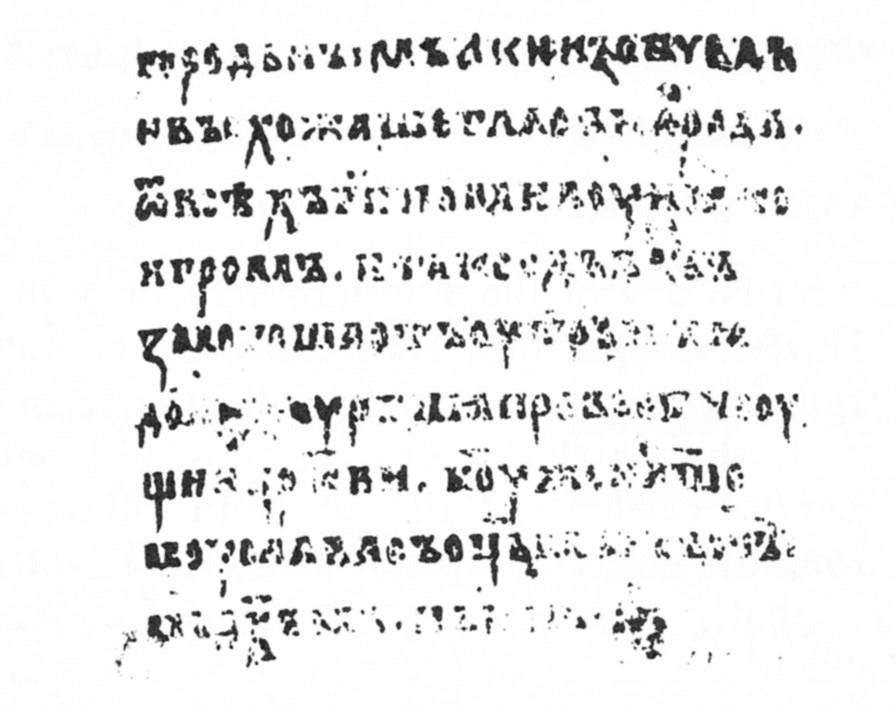
the city, there was a great multitude, just like bees. The voice of the people rose from everyone: “Lord, have mercy!” It was like thunder. And thus they were barely able to transport the relics to the church in the time between Matins and the liturgy. Glory now to our God together with the Father and the Holy Spirit.
![]()
237
Notes to Boris and Gleb
1. Many variants of this manuscript give the “Month of July, on the 24th day” as the date preceding the title of the work; see D. Abramovič, Die Altrussischen Hagiographischen Erzahlungen und Liturgischen Dichtungen über Die Heiligen Boris und Gleb (Munich, 1967), p. 27.
2. The introductory sentence seems to refer to Isaiah 65:23: “They shall not labour in vain, nor bring forth for trouble; for they are the seed of the blessed of the Lord, and their offspring with them.”
3. The date of Volodimir’s (Saint Vladimir) baptism is given variously as 987 or 988. It is not known who performed the baptism, nor is there any certainty as to the place where it first occurred. According to the Primary Chronicle (entry under the year 988), “Vladimir was baptized in the Church of Saint Basil [Vasilij], which stands in Kherson. ... Those who do not know the truth say he was baptized in Kiev, while others assert this event took place in Vasilev, while still others mention other places” (see The Russian Primary Chronicle, trans. Samuel H. Cross, p. 201). However, it is nevertheless quite possible that the baptism in Kherson was indeed a second ceremony insisted on by the Greeks as a condition for marrying Anna, the sister of the Greek Emperor Basil, and that he had already been baptized (? by the Bulgarians) in one of the previously mentioned places. In baptism, Vladimir assumed the name Vasilij (Russian for Basil). Baptism of the people of Kiev began early in 990, after his return from the Crimea.
Svjatoslav I (964—972), the son of Igor and Olga, was the first Norse ruler of Kiev. He was an indefatigable campaigner, who, it seems, planned to found a great Slavic empire that would comprise, apart from Kievan Russia, a considerable portion of the Balkans (see F. Dvornik, The Slavs, Their Early History and Civilization [Boston, 1956], p. 204). On his way home after a disastrous defeat at the hands of the Byzantines, he was ambushed and killed by the Pechenegs.
4. Perhaps because of an oversight on the part of the author, only eleven sons are identified. More curious, however, is the fact that the names given in this work do not agree with those that are found in the Primary Chronicle (Cross, p. 207), where we read, “For he [Vladimir] had twelve sons: Vysheslav, Izyaslav, Yaroslav, Svyatopolk, Vsevolod, Svyatoslav, Mstislav, Boris, Gleb, Stanislav, Pozvizd, and Sudislav.”
That Vladimir had been a polygamist before his conversion there is no doubt. He is believed to have had at least seven wives before his marriage to Anna and, after her death in 1011, to have remarried. The ensuing conflict among the many sons of Vladimir after his death was in part due to the lack of brotherly ties among them, and the considerable tension in the relations among the differing family groups.
![]()
238
As concerns Boris and Gleb, it would seem that they were illegitimate, since strict chronology would have Boris and Gleb born after around 990, hence after Vladimir’s Christian marriage. However, it is possible that their youth may have been exaggerated in the legends. It is interesting to note that there is a tradition which has Gleb as the son of Anna.
5. The Pechenegs—also called Patzinaks in Byzantine sources—were a nomadic people of Turkic extraction. During much of the tenth century they controlled the lands between the Don and the Lower Danube, and commanded the trade route from Rus’ to the Crimea. In their relations with the Russes they were at times allies, but more often enemies and a continual menace. According to the chronicles, they first attacked Rus’ in 915. As a result of the rapproachment between Rus’ and Byzantium in 988, a protracted and bitter war ensued between them and Rus’. In 1036 they were routed by Jaroslav the Wise of Kiev, and moved off to the lower reaches of the Danube from where they mounted raids against Bulgaria, Macedonia, and Byzantium. Growing gradually weaker, they were soundly defeated by the Byzantines at the gates of Constantinople in 1091. This marked their downfall. In the twelfth century they merged partially with the Polovtsy (Cumans), and in the thirteenth century with the Mongols (Tatars).
6. This is not a verbatim quotation from Proverbs 4:3.
7. On 15 July 1015 Prince Volodimir (Vladimir/Vasilij) died. Since the date of his birth is uncertain-assumed by some to be around 954—his age at death remains unknown. There is hardly any doubt as to Vladimir’s personal devotion to Christianity once baptized. Despite his pagan beginnings and pre-Christian excesses, he accepted his new faith with the greatest sense of responsibility: He saw to the Christianization of the people, built churches, promoted education, and practiced charity. Indeed, his banquets and hospitality became legendary , and were recorded for posterity by the popular imagination in the byliny, where he is the “beautiful/dear sun” (krasnoje solnyško; see D.Čiževskij, History of Russian Literature from the Eleventh Century to the Baroque [The Hague: Mouton, 1960]. p. 73). To the new Christian nation as a whole he was their baptizer, their great preceptor, who brought the Russian people to regeneration in Christ. For this the Russian Church bestowed the dignity of sainthood upon him.
8. Berestovo, an estate near Kiev that belonged to Prince Vladimir.
9. Conveying the body of a deceased person on a sledge was a part of the burial ritual of ancient Russia.
10. The entire passage from James 4:6 reads: “But he giveth more grace. Wherefore he saith, God resisteth the proud, but giveth grace unto the humble.”
11. The Slavic text refers only to a fragment of I John 4:20, which reads: “If a man say, I love God, and hateth his brother, he is a liar: for he that loveth not his brother whom he hath seen, how can he love God whom he hath not seen?”
![]()
239
12. This passage contains only apart of the first sentence from I John 4:18. The entire biblical verse is: “There is no fear in love; but perfect love casteth out fear: because fear hath torment. He that feareth is not made perfect in love.”
13. The allusion here is to Genesis 43. In verse 29 of this chapter we read the following: “And he [Joseph] lifted up his eyes, and saw his brother Benjamin, his mother’s son, and said, Is this your younger brother, of whom ye spake to me? And he said, God be gracious unto thee, my son.”
14. This passage is elliptic and omits the verb “said,” which I have added: cf. i ta vьsę polgaja vъ s̃rdci si volja tvoja (verbatim: “and considering all this in his heart this Thy will”).
15. It would appear that there is a confusion of grammatical number in this passage, all the more so since several variant readings give the expected form. Cf. Uže vse se imъ aky ne bylo nikoli že vsja sъ nimь iščezoša (verbatim: “All this for them is as though it never had been. Everything has disappeared with him”). The variant readings, which I have followed in this case, have sъ nimi (“with them”); see D. Abramovič, p. 30.
16. The entire passage from Ecclesiastes 1:2 reads: “Vanity of vanities, saith the Preacher, vanity of vanities; all is vanity.
17. The allusion in this passage appears to be to I Peter 1:22: “Seeing ye have purified your souls in obeying the truth through the Spirit unto unfeigned love of the brethren, see that ye love one another with a pure heart fervently.”
18. Part of this quotation of the words of Christ is taken from Mark 8:35, and part from John 12:25: “For whosoever will save his fife shall lose it; and he that hateth his life in this world shall keep it unto life eternal.” Compare also Luke 17: 33.
19. The Slavic passage is elliptic and reads simply: brate, xočju sъ toboju ljubъvь iměti i kъ otь cju ti pridamь (verbatim: “Brother, I wish to have good relations with you, and shall add to you to father’s”). For the sake of clarity, I have made the additions that are found in the translation.
20. Vyšegorod (Vyšgorod), a town just north of Kiev.
21. This passage refers to Isaiah 59:7-8: “Their feet run to evil, and they make haste to shed innocent blood: Their thoughts are thoughts of iniquity, wasting and destruction are in their paths. The way of peace they know not; and there is no judgment in their goings: they have made them crooked paths: whosoever goeth therein shall not know peace.”
22. The L’to (Al’ta), a river that flows into the Trubez River southeast of Kiev.
23. The martyr-saint Nikita (Nicetas) was, as was Boris, a soldier. Because he was preaching Christ among his fellow Goths at a time of fierce persecution of Christians, he was seized by the Visigothic chieftain Athanaric—one of the most zealous of the persecutors—tortured, and burned at the stake. He died in the year 372. The martyr-saint Vjačeslav (Wenceslas), the Prince of the Czechs, died at the hands of his
![]()
240
brother Boleslav in the year 929. Like Boris, he fell victim to a brother’s political ambitions (see the First OCS Life of Saint Wenceslas in this volume). According to the legend, the martyr-saint Barbara converted to Christianity against the will of her pagan father. For this he turned her over to the Roman Governor of Bithynia, Martianus, to be dealt with by the law. Unable to make her renounce Christianity, he returned her to her father, who had offered to strike off his daughter’s head. She died on 4 December 306. It is of interest to note that, according to the legend, as soon as she was beheaded, her father was struck by lightning. As a result, she is prayed to in storms; and she became the patron saint of artillery.
24. This passage seems to be alluding to II Timothy 4:7: “I have fought a good fight, I have finished my course, I have kept the faith.”
25. Boris is actually chanting the opening lines from Psalm 22:16 and from Psalm 22:12. Cf. “For dogs have compassed me: the assembly of the wicked have inclosed me: they pierced my hands and feet.” And, “Many bulls have compassed me: strong bulls of Bashan have beset me round.”
26. There is a confusion of grammatical number in this sentence, viz., a first-person plural form (vъsxotěxomъ) rather than the first-person singular. Cf. Ne vъsxotěxomъ vъziskati sebe samъ, ničto že sebe izvolixъ (verbatim: “We desired not to seek for myself alone, and I have chosen nought for myself’). Several variants of this manuscript have the expected form, xotěxъ (“I desired”); see D. Abramovič, p. 34. My translation incorporates this change.
27. The reference in this passage is to I Corinthians 13:7 and 13:5: “[Charity] bearethall things, believeth all things, hopeth all things, endureth all things.” and “ [Charity] Doth not behave itself unseemly, seeketh not her own, is not easily provoked, thinketh no evil. ..”
The biblical connection between the passages from I Corinthians 13:7 and 5 and I John 4:18 is strengthened by the semantics of the Slavic word ljuby, which means both charity and love.
28. This is not a verbatim quotation from Psalm 44:22. See also Romans 8:36.
29. This passage alludes to Psalm 55:12: “For it was not an enemy that reproached me; then I could have borne it: neither was it he that hated me that did magnify himself against me; then I would have hid myself from him ...”
In my translation I have added “against me” in the sentence “did magnify himself against me,” on the basis of another manuscript (see D. Abramovič, p. 36).
30. The repetition of prepositions—in the present case, “betweeen” (mežju)—is a type of tautology which is more frequently found in the oral tradition.
31. This is not a verbatim quotation from Acts 7:60.
32. The first day of each month in the Roman calendar was called calends. From this day, the days of the preceding month were counted backwards to the Ides, which were on the 15th of March, May, July, and October, and the 13th of every other month. In this system both the
![]()
241
calends itself and the day in question were counted when calculating time. Counting the 1st of August as the first day of calends, the 24th of July—the day of Boris’ death—was the ninth day before the calend (the 1st) of August. Boris died in the year 1015.
33. On pages 250-51 (at the conclusion of this section of notes) are the Church Slavic original and an English translation of a passage which occurs at this point in several manuscripts of the Narrative but not in the text found in the Uspenskij sbornik. The passage is taken from the published version edited by Dmitrij I. Abramovič (pp. 37-38).
34. The King James Version of the Bible phrases this passage from I Kings 22:20 and 22 as follows: “And the Lord said, Who shall persuade Ahab, that he may go up and fall at Ramothgilead; And one said on this manner, and another said on that manner.” And, “And the Lord said unto him, Wherewith? And he said, I will go forth, and I will be a lying spirit in the mouth of all his prophets. And he said, Thou shalt persuade him, and prevail also: go forth, and do so.”
It is interesting to note that the Slavic version contains the supine prelьstitь (to entice)—as opposed to “persuade”—which is the very verb used in the Revised Standard Version of the Bible.
35. This is not a verbatim quotation from Psalm 58:1 -4.
36. Compare this phrase with Luke 22:3.
37. In this monologue, Svjatopolk is paraphrasing various verses from Psalm 69. After saying “they will drive me out,” the following two lines paraphrase verses 8-9: “I am become a stranger into my brethren, and an alien unto my mother’s children. For the zeal of thine house hath eaten me up; and the reproaches of them that reproach thee are fallen upon me.” The remainder is a paraphrase of verses 25-28: “Let their habitation be desolate; and let none dwell in their tents. For they persecute him whom thou has smitten; and they talk to the grief of those whom thou hast wounded. Add iniquity unto their iniquity: and let them not come into thy righteousness. Let them be blotted out of the book of the living, and not be written with the righteous.”
38. In the oral tradition, particularly the byliny, a horse stumbling beneath its rider appears as an ill omen. It is curious that such an element — considered by many to be a mythological pagan survival—should have found its way into a work of this type. The origin of this symbolism has been traced back to the role of horses in divinations. Jakobson notes that before a war, a horse was made to stride across crossed spears; if it did so without catching its hooves on the spears, the future promised well. See Roman Jakobson, “Slavic Mythology,” Funk and Wagnells Standard Dictionary of Folklore, Vol II, 1025- 1028.
39. The Smjadin’ is a river in the Smolensk region.
40. Jaroslav (1036—1054), who became known as Jaroslav the Wise, was to be the only survivor among the sons of Vladimir of the fraternal struggle which lasted from 1015 to 1036. His reign was one of the most brilliant periods of Kievan Russia, which saw the blossoming of Russian spirituality and culture. He was a great builder (churches,
![]()
242
monasteries, the golden gate of Kiev) and played a significant role in the artistic, cultural, and literary development of Russia. He proved also to be a capable military commander and wise lawgiver.
Predslava (Peredslava) was the daughter of Vladimir and Rogneda, hence Jaroslav’s sister.
41. I am using an alternate reading (viz., imějušče) in translating the phrase “possessed of souls of savage beasts” (sverěpa zveri dušju izimajušče), since izimajušče makes little sense in this context. See D. Abramovič, p. 40.
42. In the original text this sentence reads: se něstъ ubiistvo no syrorězanie, which was translated as “this is not murder but butchery.” However, the meaning of the word syrorězanie (? butchery) is uncertain. My dictionary source for Old Russian, I.I. Sreznevskij, Materialy dlja slovarja drevne-russkago jazyka po pis’mennym pamjatnikam, has a question mark next to this entry (see Vol. Ill, p. 876). Etymologically this word is connected with “raw cutting” and it has been suggested that it means “cutting of green timber.” The image it suggests is obvious in Slavic; unfortunately I have not been able to find a precise English equivalent.
43. This passage paraphrases parts of Luke 21:12 and 16 respectively. Cf. “But before all these, they shall lay their hands on you, and persecute you, delivering you up to the synagogues, and into prisons, being brought before kings and rulers for my name’s sake.” And, “And ye shall be betrayed both by parents, and brethren, and kinsfolk, and friends; andsome of you shall they cause to be put to death.”
44. In order to make this passage clearer, I have added the words “in your thoughts” to refer to the commitment the assassins had made once they located Gleb. The Slavic is rather elliptic and simply reads, to uže sъtvorivъše, pristuplьše, sъtvorite na neže posъlani este.
45. Gleb met his death approximately six weeks after his brother.
46. This is not a verbatim quotation from Psalm 9:17.
47. This is not a verbatim quotation from Psalm 37:14-15.
48. This is not a verbatim quotation from Psalm 52:1-5.
49. The Slavs customarily buried their dead in hollowed-out tree trunks.
50. This is not a verbatim quotation from Psalm 34:20.
51. On pages 252-55 (at the conclusion of this section of notes) are the Church Slavic original and an English translation of a passage which occurs at this point in several manuscripts of the Narrative but not in the text found in the Uspenskij sbornik. The passage is taken from the published version edited by Dmitrij I. Abramovič (pp. 44-46). It should be noted that to a large extent this section is similar to the account in the Primary Chronicle (under the years 1015-1026) of the conflict between Jaroslav and Svjatopolk.
52. Rek (Rok or Rakomo) was Jaroslav’s estate that was located not far from Novgorod.
53. Such an enigmatic passage as “It is no more in my power to resurrect them,” may well attest to pre-literary Varangian influence. In all probability, as Čiževskij states, “this passage signified the declaration of bloody vengeance which abolished all moral standards, including
![]()
243
the laws of hospitality.” See D. Čiževskij, pp. 15-16. The same phrase is found in the Primary Chronicle (year 945), where it is uttered by Ol’ga before her vengeance on the Drevljane. It is obvious that the Slavs did not understand the Varangian formula for the declaration of bloody revenge.
54. Ljubec, a town in the Černigov region located at the point where the Bolgača River flows into the Dnieper.
55. That is 1016. See note 45, First OCS Life.
56. Jaroslav was indeed lame. I have translated the Slavic xromcemь as “hobbled one” in a feeble attempt to capture the word play in the original with xoromovъ (houses); cf. čto pridoste sъ xromcemь těmь? A vy plotnici sušče, a pristavimъ vy i xoromovъ rubiti.
57. A common feature of the chronicle style is the use of rigid, constant formulas in the description of set situations. Thus, a battle/fighting (seča) is almost invariably fierce/furious (zla). As a result this phrase becomes a cliche to describe the battle situation. See D. Čiževskij, pp. 57-58.
58. Ljakhs are an ancient designation for the Poles.
59. The meaning of this passage is uncertain. In his translation of the Primary Chronicle, Cross interprets it as, “Jaroslav had been in Novgorod 28 years” (p. 220). However, given the elliptical nature of this phrase, it is difficult to say with any degree of certainty to what it actually refers.
60. That is, 1018.
61. Boleslav I (Bołesfaw Chrobry) was King of Poland (992-1025). During his reign Poland conquered eastern Pomerania, Silesia, and Moravia. He also fought the Holy Roman Emperors Otto III and Henry II for the possession of Lusatia, which he received as a feif by the peace of Bautzen. In 1018 he concluded an alliance with Svjatopolk and together they managed to recapture Kiev from Jaroslav. Now Svjatopolk, convinced that Jaroslav was no longer a threat, quarrelled with his Polish allies and Boleslav returned home, taking hostages and annexing the Červan cities to Poland. At the time of Boleslav’s death, Poland was one of the strongest states in Europe.
62. The town of Velyn’ (Volyn’) was located at the point where the Guceva River flowed into the Western Bug.
63. By the eleventh century the grivna was a monetary unit in Rus’. Originally it was a weight measure.
64. That is, 1019.
65. Compare this passage to Genesis 4. Note that the first part of it paraphrases verse 10: “And he said, What hast thou done? the voice of thy brother’s blood crieth unto me from the ground.” It should be noted that the part which is translated as “sorrow and fear” takes some license with the Slavic stonanie i trjasenie (verbatim: “moaning and trembling”).
66. Other manuscripts of this work begin the concluding sentence with an apostrophy to Boris and Gleb, “O my brothers!” which makes the shift of appeal from the Lord to Boris and Gleb much smoother. See D. Abramovič, p. 46.
![]()
244
67. See note 57.
68. The number of “clashes” should not be taken literally since trebling is a common device in works of this type.
69. For the sake of clarity I have added the noun “troops” to the translation. The original omits the object of the verb; cf. i posylaxutь protivu, i ne bě gonjaščago, ni ženuščaago vъ slědъ ego.
For the description of Svjatopolk’s persecution complex, the author is obviously drawing on the curse of Cain according to Genesis 4:12: “When thou tillest the ground, it shall not henceforth yield unto thee her strength; a fugitive and a vagabond shall thou be in the earth.”
70. The concluding sentence is also a stylistic formula (cf. note 57), which is reserved for the death of pagan or impious princes. Invariably mention is made of the grave that still exists, and the evil stench issuing therefrom.
71. The allusion here is to Genesis 4:24: “If Cain shall be avenged sevenfold, truly Lamech seventy and sevenfold.”
72. Julian or Flavius Claudius Julianus was Roman Emperor from 361-363 AD. He was surnamed the Apostate because of his renunciation of Christianity. In an expedition against the Persians in March 363 he was fatally wounded in battle.
73. In order to avoid confusion, I have added the words “his body” for the omitted noun: I raskopavъše zemlju, i tako že položiša i, nedoumějušče jako že bě lepo, prečьstьně.
74. This is not a verbatim quotation from Matthew 5:14-15.
75. Compare Isaiah 35:5-6.
76. Saint Sava repeats this same phrase in the Life of Stephen Nemanja. See note 10, Life of Stephen Nemanja.
77. I am not certain which Dimitrij (Demetrius) is being referred to here. There is hardly any doubt that the city in question is Thessalonica. Perhaps the reference is to the patron saint of that city, the martyr-saint Demetrius, who died during the reign of Maximian (286—305 AD). Following the edicts of his friend and superior Diocletian (284—305 AD), Maximian burned the Scriptures, closed churches, and persecuted Christians. A number of legends grew around the figure of the martyred soldier-saint and ruler of Thessalonica, Demetrius. They were compiled by the Metropolitan of Thessalonica John during the first decades of the seventh century (circa 620) and became known as The Miracles of Demetrius of Thessalonica (Čuda Dimitrija Solunskog). In them Demetrius is credited with saving Thessalonica from the attack of 5,000 Slavs (circa 584), from a seven-day seige by the combined forces of Avars and Slavs (circa 586), and from civil war and famine (circa 602). However, it is possible, as Benz suggests, that the Demetrius in question was a seventh-century bishop of Thessalonica (see Ernst Benz, Russische Heiligenlegenden [Zurich, 1953], p.500).
78. This passage contains a word play with the name of the city, Vyšegorod: Blaženъ po istině i vysokъ pače vsěxъ gradъ rusьskyixъ i vyšij gradъ, imyj vъ seb takove skrovišče, emu že ne tъcьnъ ni vьsь mirъ!
![]()
245
Po istině Vyšegorod narečesja: vyšij i prevyšij gorodъ vsexъ... Since I am forced to retain the name of the city (Vyšegorod), which in itself could be translated as “Exalted City” (bearing in mind the etymology of the English verb ex = out/up + altus = high, and the Slavic adjectival root vyš- = high), the word play is lost in translation.
79. Selun is the Slavic designation for Thessalonica, the one-time second city of the Byzantine Empire after Constantinople.
80. This quotation is a loose paraphrase of John 14:12: “Verily, verily, I say unto you, He that believeth on me, the works that I do shall he do also; and greater works than these shall he do; because I go unto my Father.”
81. At the beginning of this work mention is made of the fact that Boris was named Roman in holy baptism. It is curious that no mention was made prior to this of Gleb’s baptismal name, David.
82. It would appear that the reference here is to Psalm 16:3: “But to the saints that are in the earth, and to the excellent, in whom is all my delight.”
83. Perhaps this passage alludes to Psalm 86:10: “For thou art great, and doest wondrous things: thou art God alone.”
84. John of Damascus (Johannus Damascenus, ? 700—754) was considered one of the ablest philosophers of his day. He was known as Chrysorrhoas, meaning “stream of gold” because of his oratorical ability. Before his retirement in 730 to the Monastery of Saint Sabas near Jerusalem, he wrote in defense of the worship of ecclesiastical images in defiance of Emperor Leo III the Isaurian’s edicts against image worship. After his retirement to the monastery, he was ordained a priest and spent the remainder of his life in religious study. He is perhaps best-known as the author of The Fount of Knowledge, the standard textbook of dogmatic theology in the early Greek Church. This book is divided into three parts: Heads of Philosophy, Compendium of Heresies, and An Exact Exposition of Orthodox Faith. It is to the last part that our passage refers. This part contains a complete theological system based on the teachings of the early Greek Church Fathers and Church synods from the fourth to the seventh centuries.
85. A variant reading of this sentence has: mьrtva bo plъtь, vladyko, čjuda tvoriti ne možet (“For dead flesh, O Lord, cannot work miracles”); see D. Abramovič, p. 52.
86. Compare James 1:17; 1:6.
87. In the text this sentence reads: koliko sja imaši potruditi, da zastupьnika obrjaščeši, kъ sъmrьnumu cesarju privodjaščju, i tebe radi otъvěty tvorjaščju, ali nъ pristavьniky vьsego roda, iže kт Bogu za ny i molitvy tvorjatь. According to variant readings, the participles privodjaščju and tvorjaščju, which in this text are datives, appear as accusatives (modifying appropriately zastupьnika), privodjašča and tvorjašča. Furthermore, nъ (but), which makes no sense here, according to other variants should read iny (other). See D. Abramovič, p. 52.
My translation reflects these changes.
88. The prepositional phrase vъ sixъ (in these) seems to be out of place
![]()
246
in this sentence: Ne li ny ubo počьstie tvorjašče, tvorjatь crьkvi i Bogu vъ sixъ imena priplody prinosjaščemъ... Part of this very sentence is used to explain one of the meanings of the entry priplodъ (be- nefit/use) by Sreznevskij (Vol. II, p. 1445) where we read: Vsexъ imena priplody prinosjaščemъ . . .(“the names of all those who were of benefit .. .”). I have incorporated this change in my translation.
89. This is not a verbatim quotation from I Corinthians 1:18.
90. Compare also Romans 9:33.
91. In another variant of the manuscript, this section is entitled “On the Discovery of the Venerable Relics of the Holy Passion-Sufferers Boris and Gleb.” See D. Abramovič, p. 53. In translating the title of this section as “On the Disinterment of the Saints” (0 iznesenii svjatoju), I have taken some liberty with the noun iznesenie, which means literally “carrying out.”
92. Jaroslav had five sons. He gave each of them a principality, keeping for the eldest, Izjaslav, Kiev and Novgorod. In order to avoid feuds among his successors, he adopted the Germanic system of “tanistry.” According to this system, the father is not succeeded by his son but by his younger brother, and the youngest brother is followed on the throne by the eldest of his nephews (see F. Dvornik, p. 213). At first this system was observed with some regularity: Izjaslav I (1054—1073) was followed on the throne of Kiev by his brothers Svjatoslav (1073—1076) and Vsevolod I (1078—1093). Succession then fell to Izjaslav’s son Syjatopolk II (1093—1113), and after him to Vsevolod’s son Vladimir Monomakh (1113—1125). After Jaroslav’s death a period of trouble followed nevertheless, and Izjaslav was forced to share his power with his brothers.
93. Of all the people (and places) mentioned here, the most important one is Theodosius of the Cave Monastery. Saint Theodosius was to become the founder of Russian monasticism, and the Cave Monastery in Kiev (Kievo-Pečerskaja Lavra), the most important literary and spiritual center in medieval Russia.
94. For the sake of clarity, I have added the words “his hand.” The original omits the object of the verbal participle: Vъzьmъ že, Georgij mitropolitъ... (verbatim: “Taking, the Metropolitan George”).
95. See note 83.
96. In order to make the passage more clear, I have substituted “enslaved” for the non-specific “this”: Sudjašči že ne poslabiša tomu takomu byti . . . (verbatim: “However those sitting in judgment did not permit that one to be this . ..”).
97. For purposes of clarity, I have added the noun “icon” to the text. The original simply translates “walking with crosses toward the Holy Mother of God” (iduščemъ sъ krьsty kъ svjatěi Bogorodici).
98. Prokymen (Greek prokeimenon) is a verse chosen from the Psalms in accordance with the feast, and sung before the reading of the Epistles.
99. The saint in question appears to be the Martyr-Saint George, who died around 303. His life is obscured by legend, but his martyrdom at Lydda (in Palestine) is generally considered a historical fact. The most
![]()
247
popular of the legends that grew up around the figure of Saint George has to do with his encounter with a dragon which he killed. In the fourteenth century he became the patron saint of England. His feast day is celebrated April 23rd.
100. This passage seems to allude to Psalm 37:4: “Delight thyself also in the Lord; and he shall give thee the desires of thine heart.”
101. The allusion in this passage is to John 21:25: “And there are also many other things which Jesus did, the which, if they should be written every one, I suppose that even the world itself could not contain the books that should be written. Amen.”
102. See note 92. David and Oleg are the brothers of Volodimir (Vladimir II Monomakh), the sons of Vsevolod.
103. This is not a verbatim quotation from Psalm 101:4-5.
104. I have added an object to the verb “give”—“money.” In the original the sentence reads: . . . i po vsja nedělja vъdavasta straževi tomu da kupivъ. . . (verbatim: “and for weeks on end gave to the guards to buy ...”).
105. Since this passage contains no verb, I have added one, “happened.” Cf. sicьmь ubo obrazъmъ (verbatim: “and in this way”).
106. In the narration of the miracle, we find now indirect speech, now direct speech—a type of speech which is rarely met in Old Slavic manuscripts. Perhaps because of the confusion of speech, errors found their way into the account. For example, compare the following sentences: ... idi ty vъ cьrьkovь i povežь sice, jako že esi vidělъ, a sego podrnga ego ostavljaevě utrь ... (verbatim: “You, go to the church and tell what you have seen, but leave this friend of his inside”). Since the reference is to his own friend (his fellow prisonmate), it would seem that “his” (ego) should be “your” (tvoego). I have made this correction in my translation.
107. This passage simply reads, Otvrъzъše i vъšьdъše (verbatim: “When they opened and entered”). I have added the omitted object of the verb, “the prison,” to the translation.
108. See note 92. Volodimir (Vladimir) Monomakh became ruler in Kiev because of popular dissatisfaction with Svjatopolk, and his resounding victories (1103 and 1111) over the Cumans (Polovci), a nomadic people of Turkic extraction who had invaded the steppes in the sixties of the eleventh century. The Byzantine name Monomakh was assumed by Vladimir through his mother, Maria, who was a Greek princess. He was a benevolent ruler (at least toward Christians) who displayed a good understanding of social problems. Hence, he enacted legislative measures which favored the lower classes, an action which showed not only enlightened statesmanship but also revealed his Christian spirit. And this was displayed even more clearly in his famous Testament (Poučenie) to his sons in which he admonished them to fear God and love their fellow man. Because of his great popularity, his eldest son, Mstislav I (1125—1132) was able to succeed him to the throne of Kiev.
109. In order to be more clear, I translated this sentence “the people
![]()
248
worshiped and rendered praise to God”; cf. poklanjaxusja, xvalu vъzdaša Bogu ...
110. That is, 1102.
111. This passage paraphrases only a small portion from Matthew 6:19-20. Cf. “Lay not up for yourselves treasures upon earth, where moth and rust doth corrupt, and where thieves break through and steal: But lay up for yourselves treasures in heaven, where neither moth nor rust doth corrupt, and where thieves do not break through or steal...
112. “His” in this sentence refers to Svjatoslav. See note 92.
113. That is, 1113.
114. In the original this sentence reads, I vъstаvіvъšе na sani na rosny ... (verbatim: “And upon placing on sledges on separate ...”). Since the direct object of the verb is omitted, I have added “the saint.” Note also the repetition of the preposition na (see note 30).
115. For the sake of clarity I have added the noun “sledge” to this sentence. Cf. I idaxu vlekušče uži že velikymi těsnjaščesja i gnetušče velьmože i vse boljarьstvo (verbatim: “And the nobles and all the boyars walked, pulling with great ropes, crowding and pressing”).
116. In translating this sentence I have added the word “them.” The Slavic simply reads: ... da byša dostoini byli prikosnutisja (verbatim: “that they might be worthy to touch”).
117. In order to avoid confusion, I have substituted “Boris” for the ambiguous pronoun “him”, cf. Takože i svjataago Glěba po nemь vъstavivъše na drugyja sani (verbatim: “And Saint Gleb was placed in the same manner on another sledge behind him”).
118. Since this sentence contains no verb, I have added “walked”, cf. I Davidъ sъ nimь i episkopi (verbatim: “And David beside him, and the bishops’).
PASSAGES EXCERPTED FROM D.I. ABRAMOVIČ
(See notes 33 and 51 above)
[Вѣнецъ 33 приемь отъ Христа Бога, съ праведьными причтеся, съ пророкы и апостолы и с ликы мученическыми водваряяся, и Авраму на лонѣ почивая, видя неизреченьную радость, въспѣвая съ ангелы, веселяся в 34 лицѣ 35 святыхъ. И положиша тѣло его, принесоша тай Вышегороду, у церькви святого Василия, въ земли погребоша 36. Оканьнии же убийци придоша къ Святополку, акы хвалу имуще, безаконьници. Сици 37 бо слугы бѣси бываютъ. Бѣси бо на злое посылаеми бывають 38, ангели 39 на 40 благое слеми бываютъ 41. Ангелъ человѣку 42 зла не стваряеть 43, нъ благое мыслить ему всегда, паче же хрьстьянамъ помогаетъ и заступаетъ отъ супротивьнаго диявола; а биси 44 всегда на злое ловятъ, всгда 45 завидяще ему,
![]()
249
понеже видить 1 человѣка Богомъ почтена, и завидяще ему, на злое шлеми 2 и скори суть. Рече бо Богъ: кто идеть прѣльстить 3 Ахава? — и рече бѣсъ: се азъ иду. Зълъ 4 человѣкъ 5, тъщася 6 на злое, не хужеши есть бѣса. Бѣси бо человѣка боятся, а зълъ человѣкъ ни Бога ся боить, ни человѣка ся стыдить 7; бѣси креста 8 боятся Господня, а человѣкъ золъ ни креста ся боить 9. Тѣмже и 10 глаголаше 11 Давидъ: «аще воистину право 12 глаголете, правду 13 судите, сьшове человѣцьстии, ибо въ сердци безаконуете 14 на земли 15, неправды 16 рукы ваша съплѣтають, учюжени быша грѣшници отъ ложеснъ, заблудиша 17 отъ чрева, глаголаша 18 лжю: ярость ихъ по образу змиину».]
[Не received the crown from Christ Our God, and was counted among the just, taking his place with the prophets and apostles and the assembly of martyrs, and reposing in the bosom of Abraham, beholding ineffable joy, and singing with the angels, and rejoicing in the presence of saints.
And they brought him secretly to Vyšegorod, laid his body in the earth, and buried it near the Church of Saint Vasilij. Now the accursed murderers came to Svjato- polk as if they deserved praise, the criminals! For such servants are devils, as devils are sent to do evil but angels are sent to do good. An angel does evil to no man but always thinks of his good; moreover, he helps Christians and defends them from our foe, the Devil. But devils are always in pursuit of evil, and always envy man, for they see him esteemed by God. And envying him, they are quick to be sent to do evil. For God said: “Who goes forth to entice Ahab?” And the Devil said: “Lo, I will go forth.” [34] An evil man who aspires to evil is no better than a devil. For devils fear man, but an evil man neither fears God nor feels shame before man. Devils fear the cross of the Lord, but an evil man fears not even the cross. Therefore did David say: “Do ye indeed speak righteousness? Do ye judge uprightly, О ye sons of men? (Psalm 58:1-4) Yea, in heart ye work wickedness; your hands plait injustice on the earth. The wicked are estranged from the womb: they go astray as soon as they are born, speaking lies. Their fury is like that of a serpent.”] [35]
![]()
250
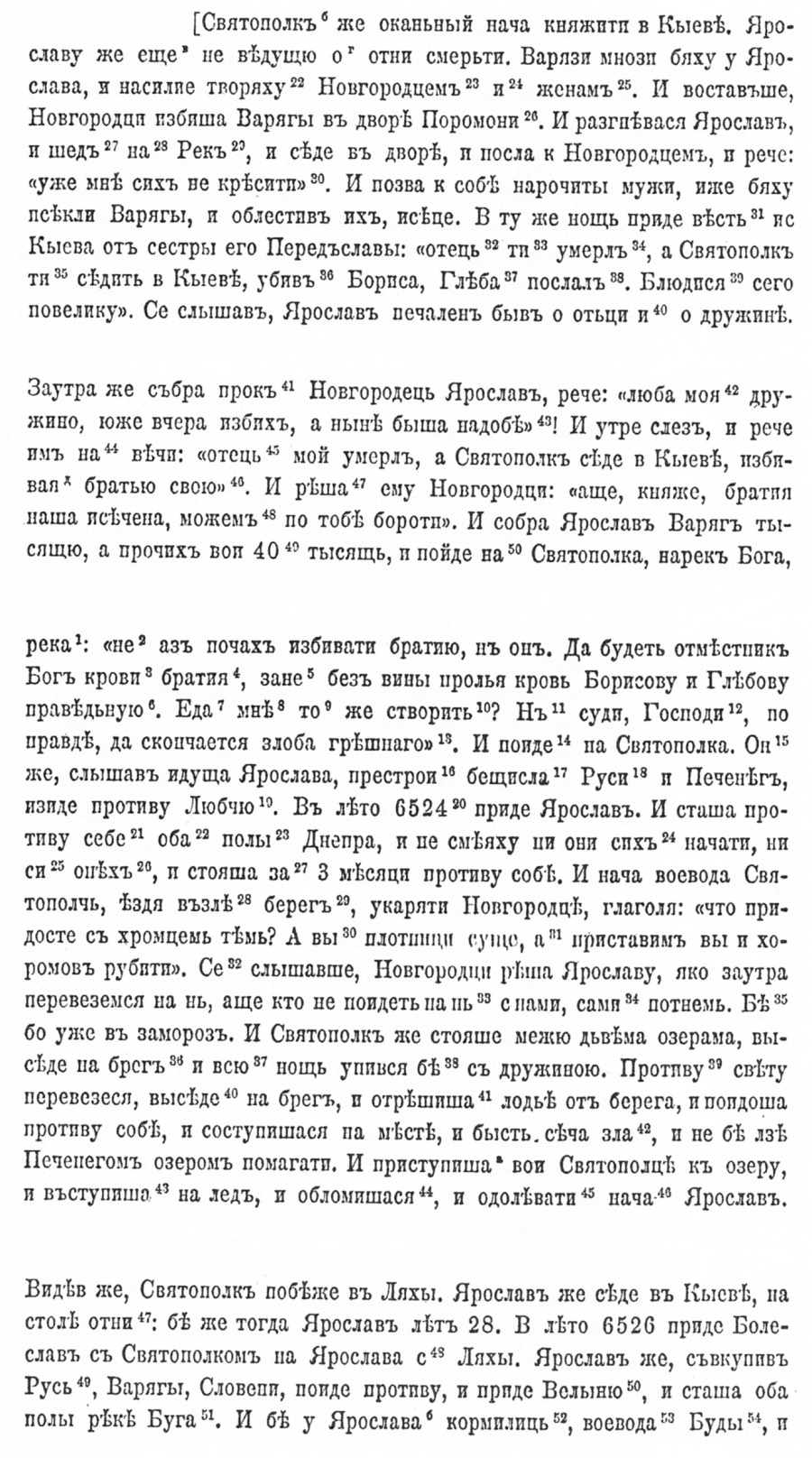
![]()
251
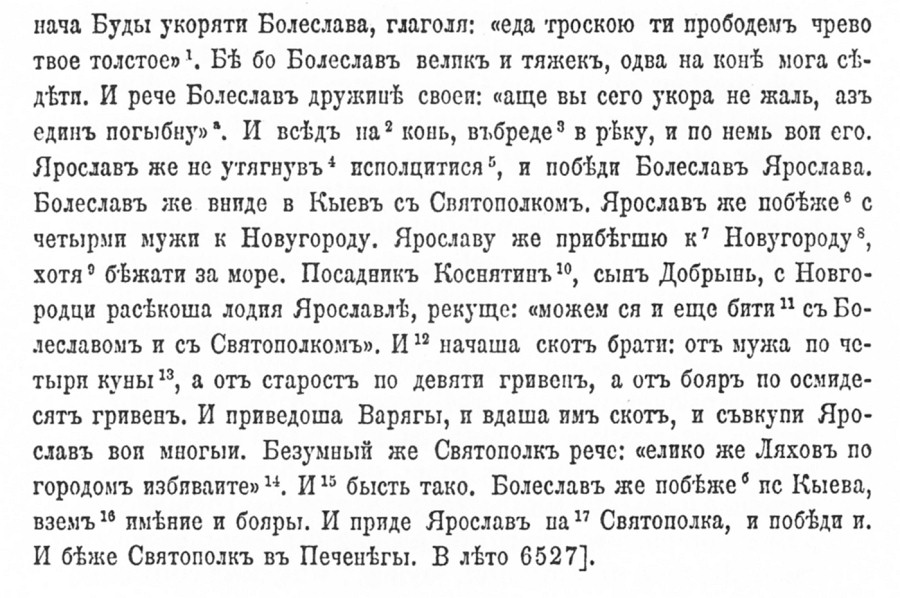
[And the accursed Svjatopolk began to rule in Kiev. Now Jaroslav did not yet know of his father’s death. Jaroslav had many Varangians under his command, and they did violence to the men of Novgorod and to their women. And the inhabitants of Novgorod rose and killed the Varangians in the court of Pomoron. Jaroslav was greatly angered, and going to Rek [52] he established himself in the court there and sent a message to the inhabitants of Novgorod, saying: “It is not in my power to resurrect them now.” [53] And he summoned before him the notable men who had massacred the Varangians, and having deceived them, he massacred them. That same night news came from Kiev, from his sister Peredslava: “Your father has died, and Svjatopolk is established in Kiev. He has killed Boris and is after Gleb. Be most wary of this one.” Upon hearing this, Jaroslav was grieved about his father and his retinue.
The next morning Jaroslav gathered the remnant of the men of Novgorod and said: “My beloved retinue whom I was killing yesterday but have need of today!” He wiped away his tears and spoke to those in the assembly: “My father has died, and Svjatopolk is established in Kiev and is killing his brothers.” And the men of Novgorod said to him: “Even though our brothers have been massacred, О Prince, we can fight for you.”
![]()
252
And Jaroslav gathered one thousand Varangians and forty thousand other soldiers and marched against Svjatopolk, having called upon God, saying: “It was not I who began killing our brothers, but he. May God be the avenger of the blood of my brothers, for Svjatopolk has shed the just blood of Boris and Gleb without cause. Perhaps he will do the same to me? But judge, O Lord, according to justice, so that the malice of the sinner may end.” And he marched against Svjatopolk. When he heard that Jaroslav was coming, he prepared an innumerable force of Russes and Pechenegs, and marched out toward Ljubec. [54]
Jaroslav arrived in the year 6524. [55] They stood facing one another on both banks of the Dnieper, and neither the one nor the other dared begin. And they remained facing one another for three months. Then Svjatopolk’s commander, while riding along the shore, began to taunt the men of Novgorod, saying: “Why have you come with that hobbled one? You are carpenters and we shall put you to work on our houses.” [56] When the men of Novgorod heard this, they said to Jaroslav: “Tomorrow we shall cross over to them, and whoever will not go with us against them, we ourselves shall kill.”
It was already beginning to freeze now. Svjatopolk was camped between two lakes and, having disembarked on the shore, was reveling with his retinue all night long. Toward dawn Jaroslav crossed over. He disembarked on the shore and they pushed the boats from the bank. And the two forces advanced against one another and met upon a field. And the fighting was fierce. [57] Because of the lake the Pechenegs could not help, and Svjatopolk’s troops came to the lake and went out onto the ice, and it broke and Jaroslav began to triumph. Upon seeing this, Svjatopolk fled to the Ljakhs. [58] And Jaroslav was established in Kiev upon his father’s throne. Jaroslav was then twenty-eight years old. [59]
In the year 6526 [60] Boleslav, [61] together with Svjatopolk and his Ljakhs, attacked Jaroslav. After gathering Russes, Varangians, and Slavs, Jaroslav advanced against them. When he came to Velyn, [62] they camped on both sides of the river Bug. Now Jaroslav had with him his mentor and general named Budy. And Budy began to taunt Boleslav, saying: “We shall pierce your fat belly with a stake.” For Boleslav was big and heavy, and could barely sit upon a horse. Then Boleslav said to his retinue: “If you are not insulted by this reproach, I shall perish alone.”
![]()
253
And mounting his horse, he rode into the river and his troops followed him. But Jaroslav had no time to marshal his troops, and Boleslav defeated Jaroslav. And Boleslav entered Kiev with Svjatopolk.
Jaroslav now fled to Novgorod with four men. After Jaroslav had come to Novgorod, he wanted to flee overseas, but Mayor Constantine, son of Dobrynja, together with the men of Novgorod, destroyed Jaroslav’s boats, saying: “We can still fight with Boleslav and with Svjatopolk.” And they began to collect money: four marten skins from each freeman; ten grivny [63] from each elder; and eighteen grivny from each boyar. They brought in Varangians and gave the money to them. Thus did Jaroslav gather many troops.
Then the mad Svjatopolk said: “However many Ljakhs there are in the cities, kill them.” And so it came to pass. But Boleslav fled from Kiev, taking property and boyars. And Jaroslav attacked Svjatopolk and defeated him. And Svjatopolk fled to the Pechenegs. The year was 6527.] [64]
